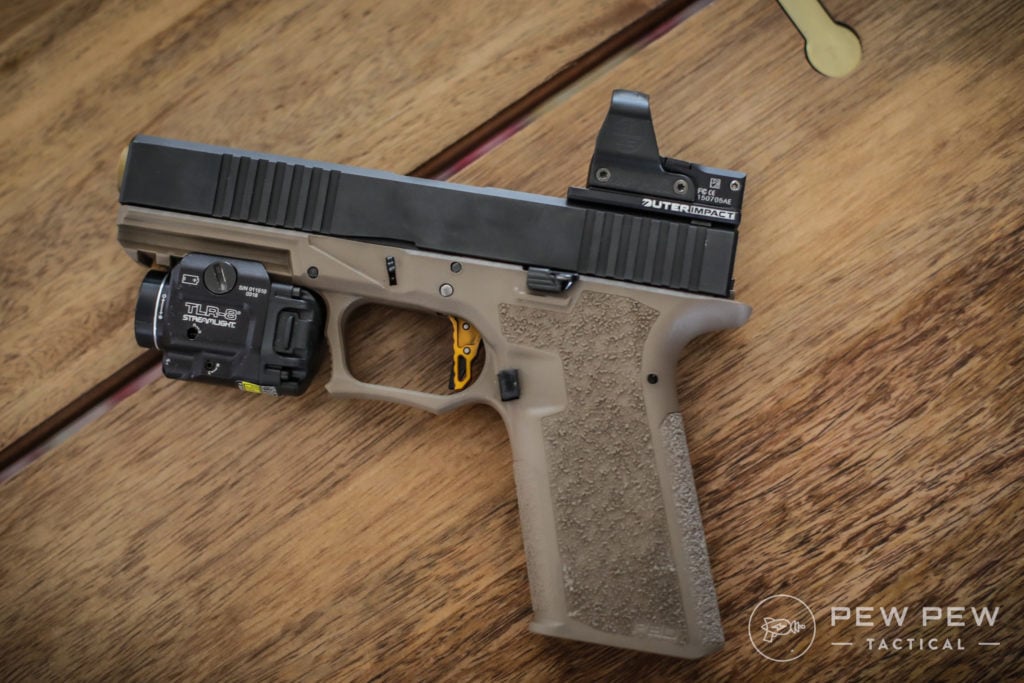Your cart is empty
Prices accurate at time of writing
Pros
Cons
Specs
The regular Holosun 507C is already a major contender that punches way above its price point. This is thanks to its massive battery life, RMR footprint, durability, and reasonable pricing.

Enter the collaboration with Primary Arms’ reticle smiths to make the HS507C X2 ACSS Vulcan.
We really like it…like a lot.
For our use, nothing has slowed it down. It is robust and has stood up to the abuse we’ve thrown at it, including things like using the optic as a contact point to charge our Glock off of a belt or table.
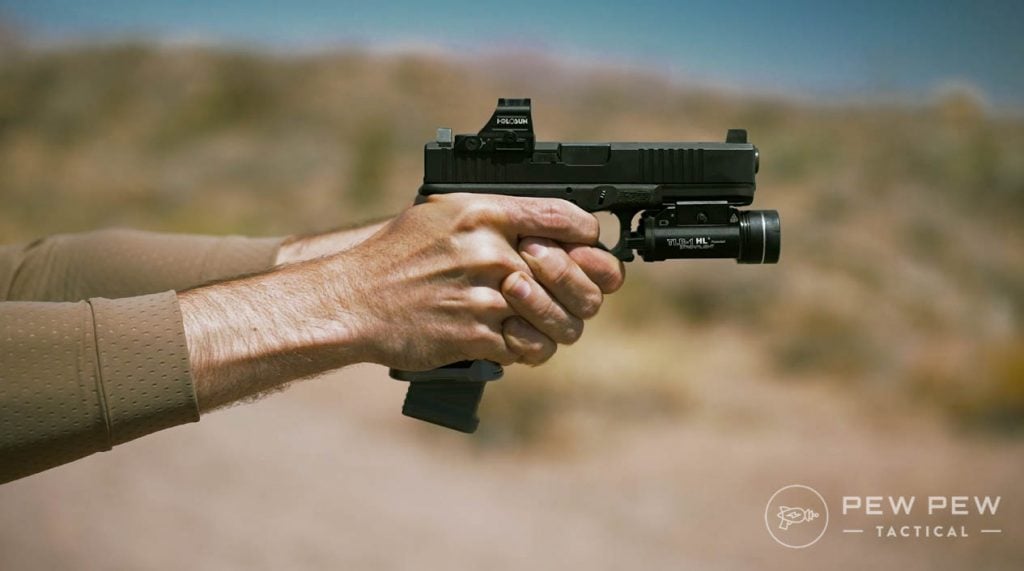
The glass has also been completely scratch-free thus far. Buttons are easy to access and manipulate on the left side.
At over 20,000 of battery life, the Holosun 507C ACSS is an optic that you will likely never replace the battery on from use…just remember to change it every one to two years to keep it fresh.
There’s also a solar panel on top that gives another source of power for when the optic is in sunlight. However, the solar panel does not recharge the battery in any way.
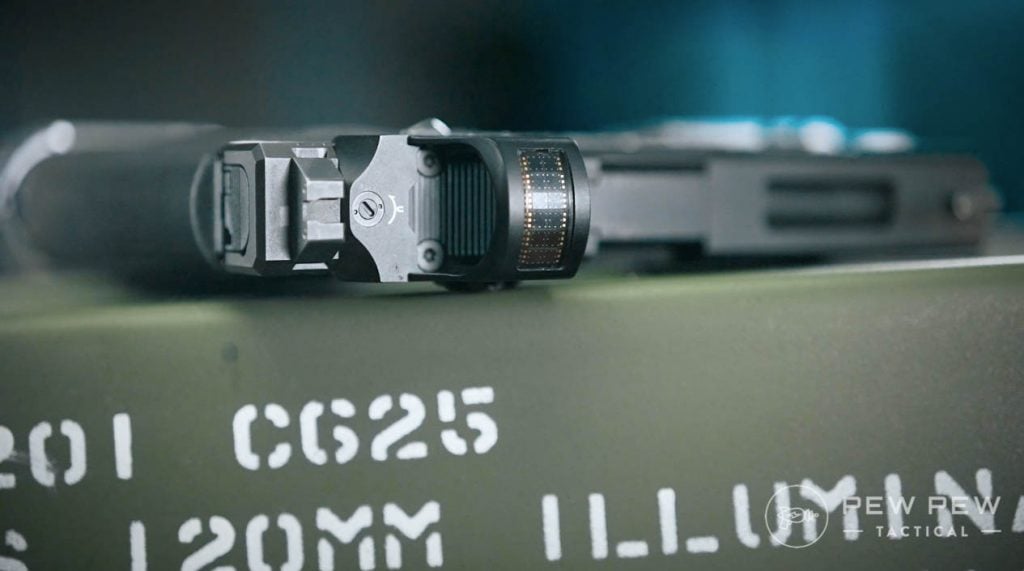
The 507C also features “Shake-Awake,” meaning it will automatically turn on as soon as it senses movement and will turn off after a period of no movement. This is very handy for setting and forgetting and for saving battery life.
Lastly, there’s a nice tray that slides out for the battery, meaning you don’t have to take the entire unit off your handgun and lose zero each time you swap the battery.
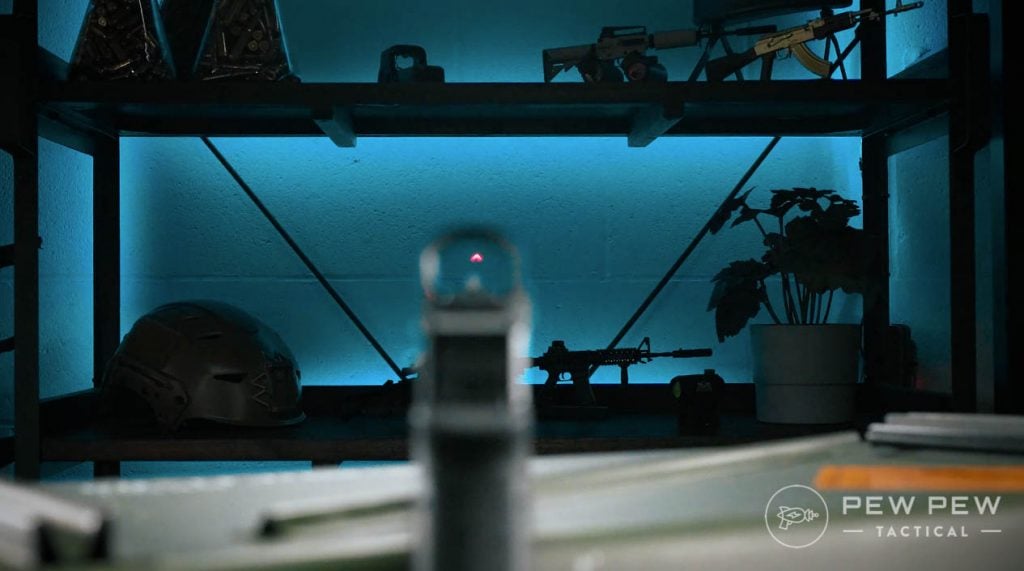
Check out that nice 10 MOA chevron reticle which draws you to the center.
But that’s not all (sorry…couldn’t resist); there’s also a ring on the outside to show you if you’re off-center.
Once you really get the hang of it…you shouldn’t see the ring anymore. And you can actually disable it to save battery life. But it’s a great training feature.
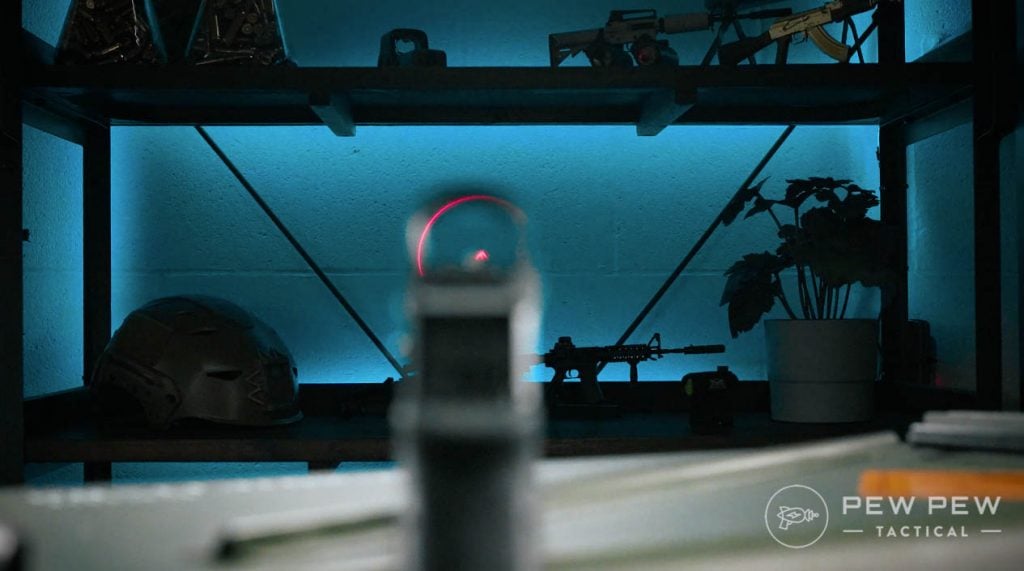
The 507C uses the same footprint as the Trijicon RMR. With the number of slides that can mount the HS507C without the need for adaptor plates, this is a huge blessing.
It also makes it a great option for people who have older-gen RMRs and are looking to modernize. We’ve mounted multiple 507Cs to various pistols with great ease and success.
And with a Picatinny adapter, we even put it on our K-USA KP-9 9mm AK.
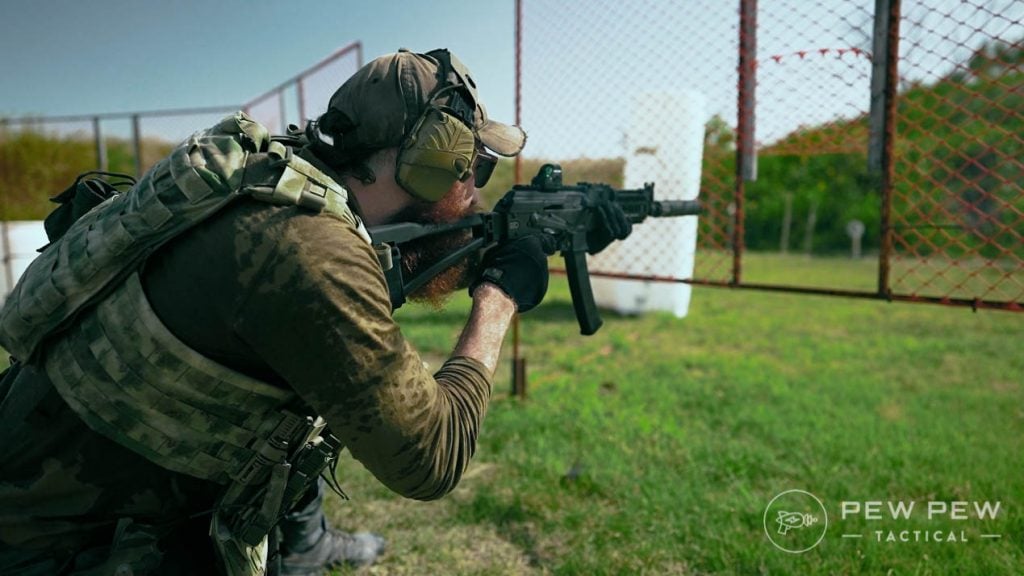
Pros
Cons
Specs
The RMR Type 2 is the gold standard of pistol-mounted mini red dots. It is pricey, but it has the most robust housing of all the pistol dots out there and is battle-proven.
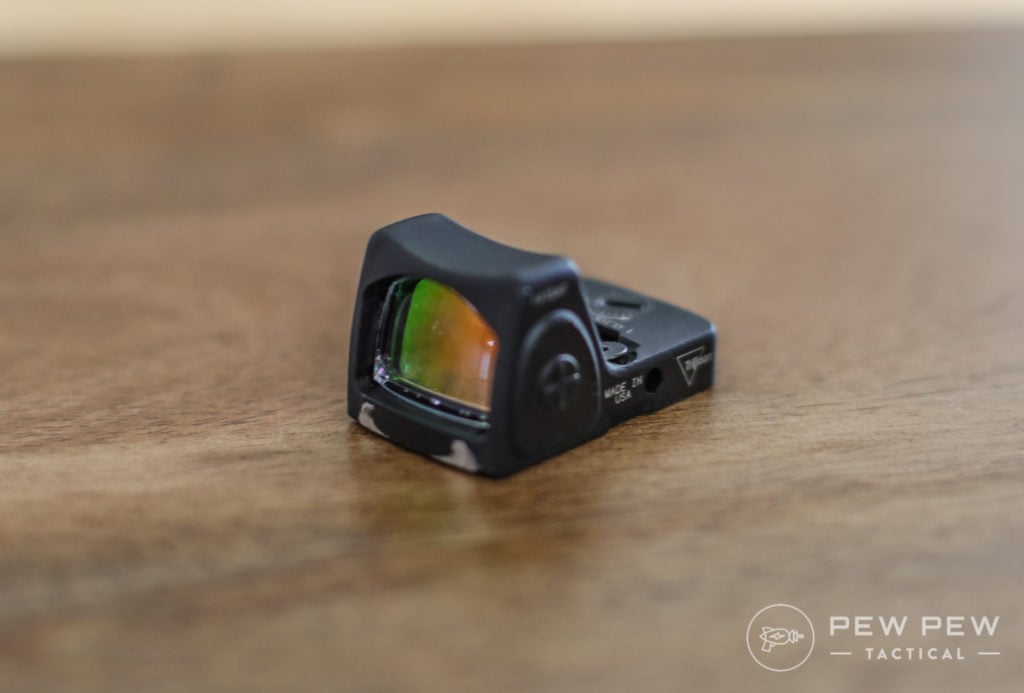
Battery life clocks in at four years of continuous on at the very usable level 4 brightness level. However, if you’re using this on duty or using it at higher settings, I’d change the batteries every year.
One con of the battery is that it is on the bottom of the sight, meaning you have to unmount and re-zero each time you change it.
Also, depending on your slide, you might need a sealing plate to make sure water does not get in. I got one just in case for my Glock Grey Ghost Precision slide (full review) since the sides were a little exposed.
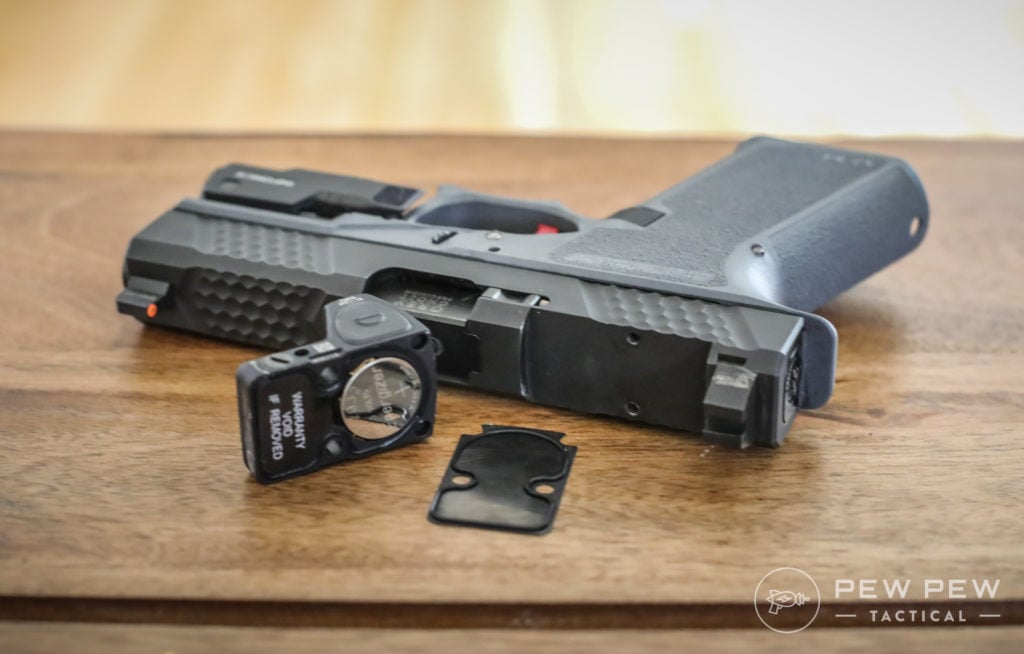
Control-wise, the buttons are easy to use and tactile. No complaints here.
Glass is the most blue-tinted due to its special reflective coating that enhances battery life. The RMR also has a smaller viewing window than many competitors, but it’s not that big of a deal when if you shoot with both eyes open.
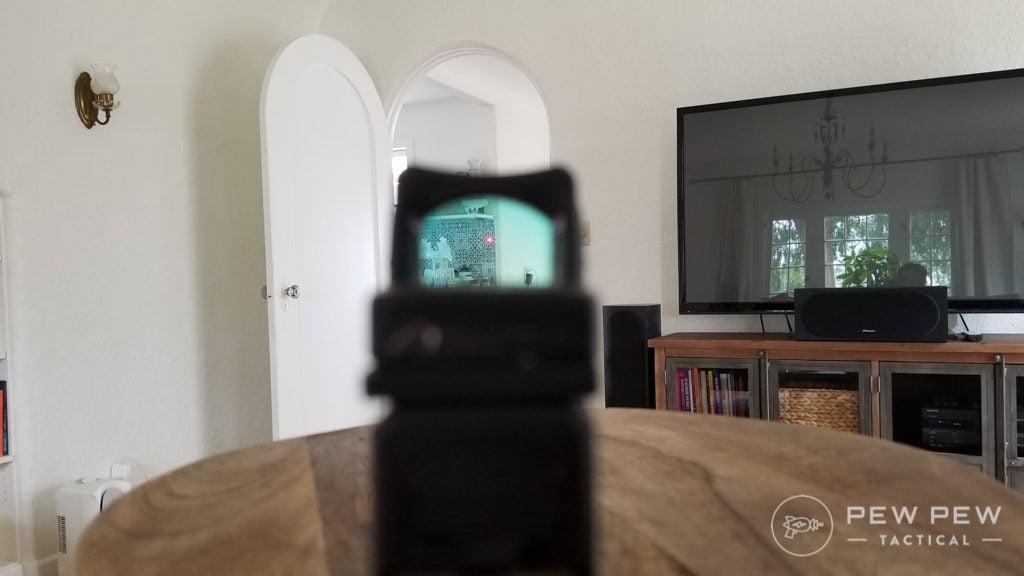
Another huge plus for the RMR series…there’s the biggest selection of custom slides already milled for them.
The RMR also works well with night vision. On the lowest brightness setting, the dot becomes like a laser on target, making NVG shooting a breeze compared to night sights.
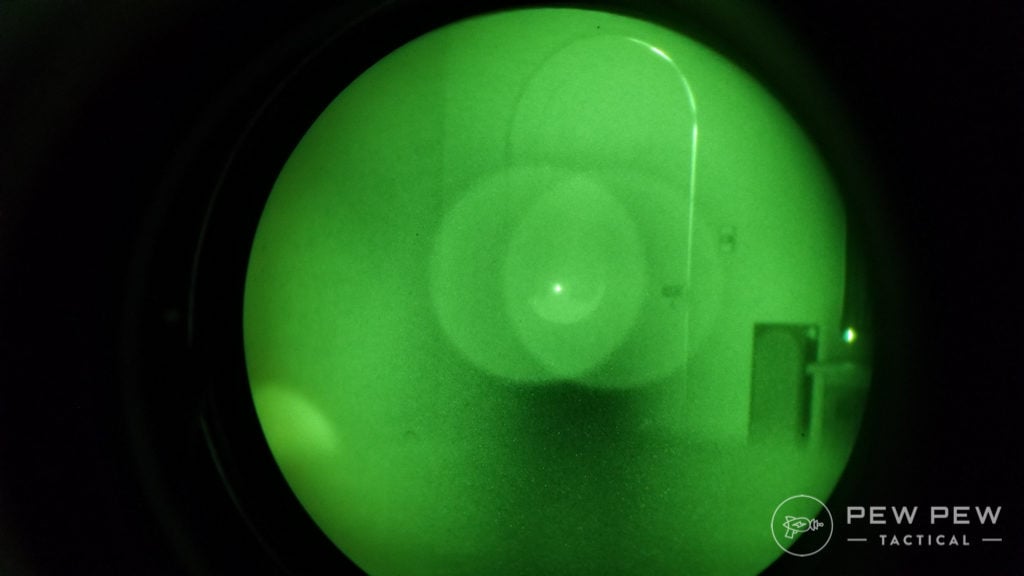
We recommend the Type 2 over the Type 1 due to the upgraded electronics that combat the fairly common flickering problem seen in Type 1’s.
I recommend either the 3.25 or 6.5 MOA dot models, however they offer other models with different-sized dots, mounts, and even tritium dual illumination.
Lastly, the Type 2 allows you to manually adjust the brightness so you can pick the best for your environment. I have never found auto-adjusting dots to work very well.
Prices accurate at time of writing
Pros
Cons
Specs
A recent entry into the red dot space from Primary Arms, the SLx RS-10 is our go-to recommendation for an affordable red dot that is still rock solid.
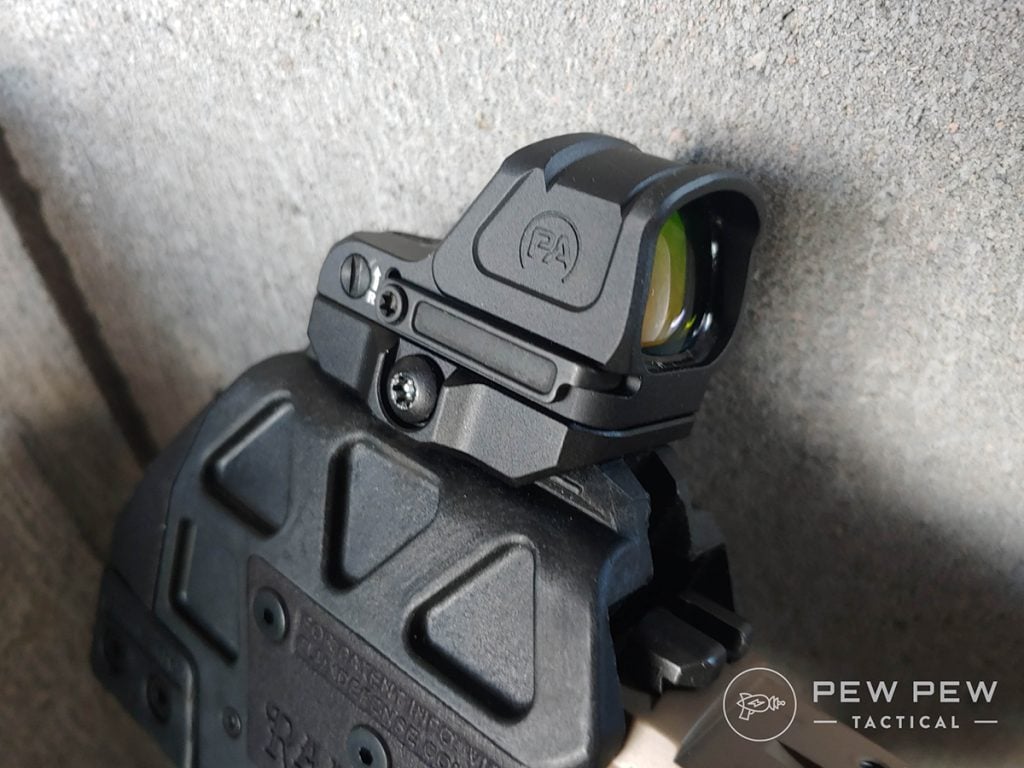
This thing is rugged, and the build quality exceeds its affordable price tag. Look-wise, the hood is cool, and the small PA logo is not too intrusive.
We dropped it a total of 9 times while attached to a Flux Raider in our full review. Besides some expected scratches, it cleaned right up with some water and held zero.
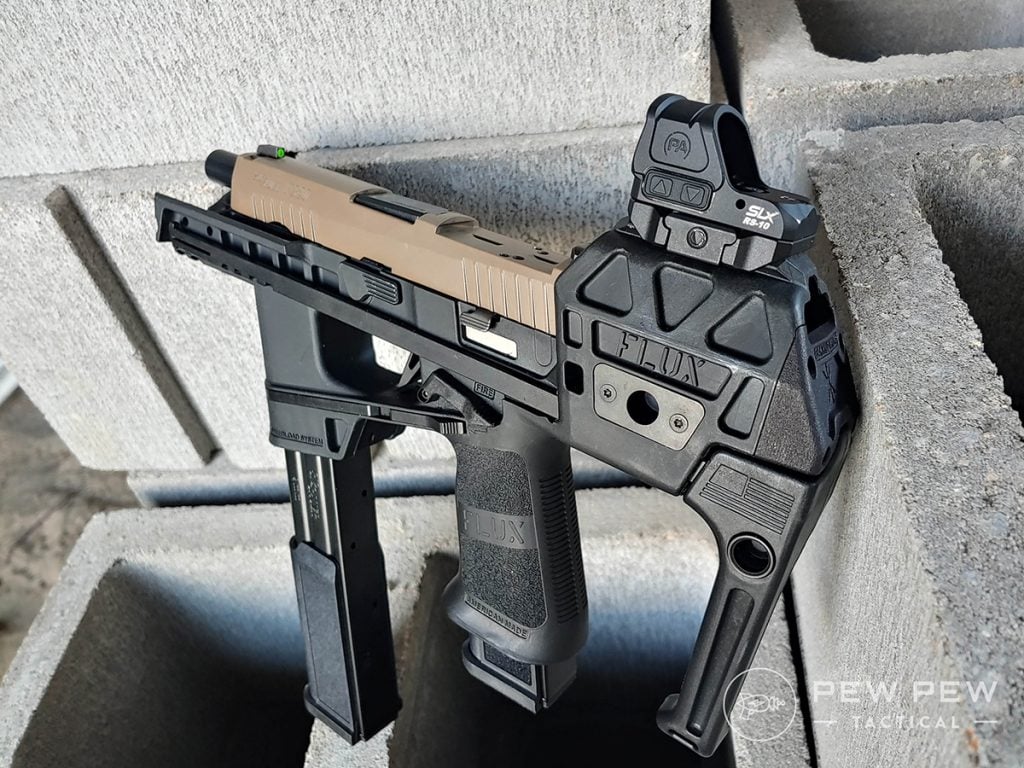
This little dot is awesome with 25-50k battery life…and also comes with shake-awake! That makes it extra nice as a CCW optic, where you don’t have to mess with buttons when you put it on and off.
The 3-MOA dot is crisp, but there’s a noticeable blue tint when looking through the glass. However, it doesn’t feel any worse than other red dots.
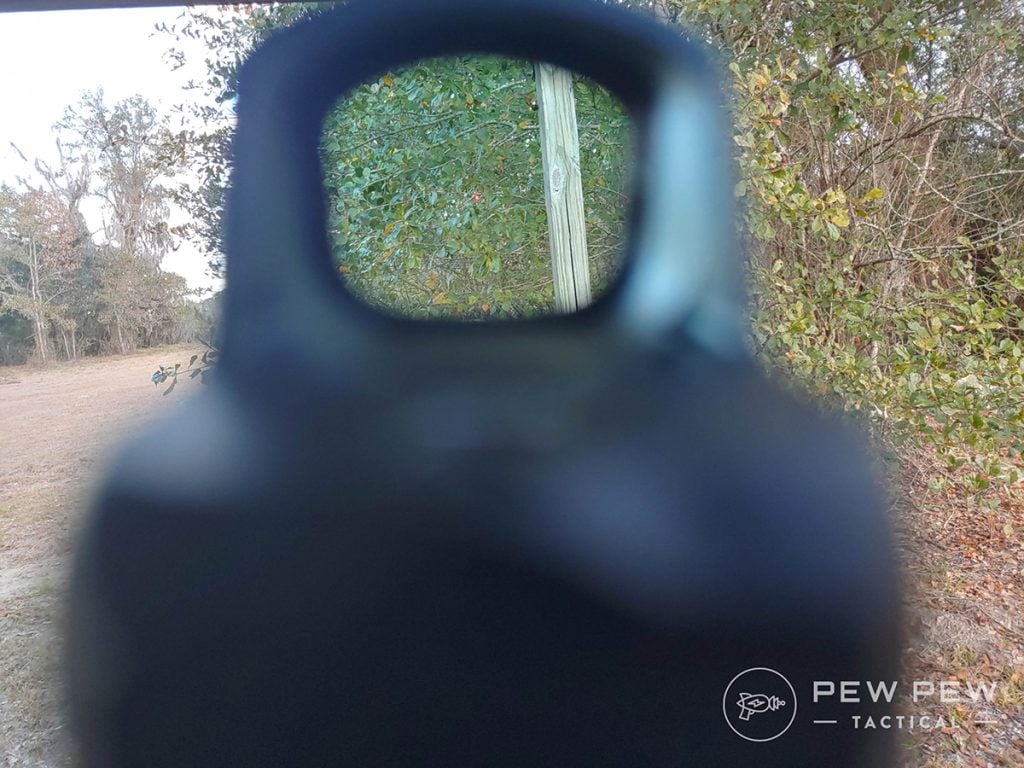
That said, one annoyance is that there’s a reflection of the U and arrow designating up adjustments right above the dot. It doesn’t show up well in pictures, but once you see it with your own eyes, it’s hard to stop seeing it.
The dot is also super bright, so it’s suitable from sunny Florida to scorching California. And, of course, you can dim it for indoor use.
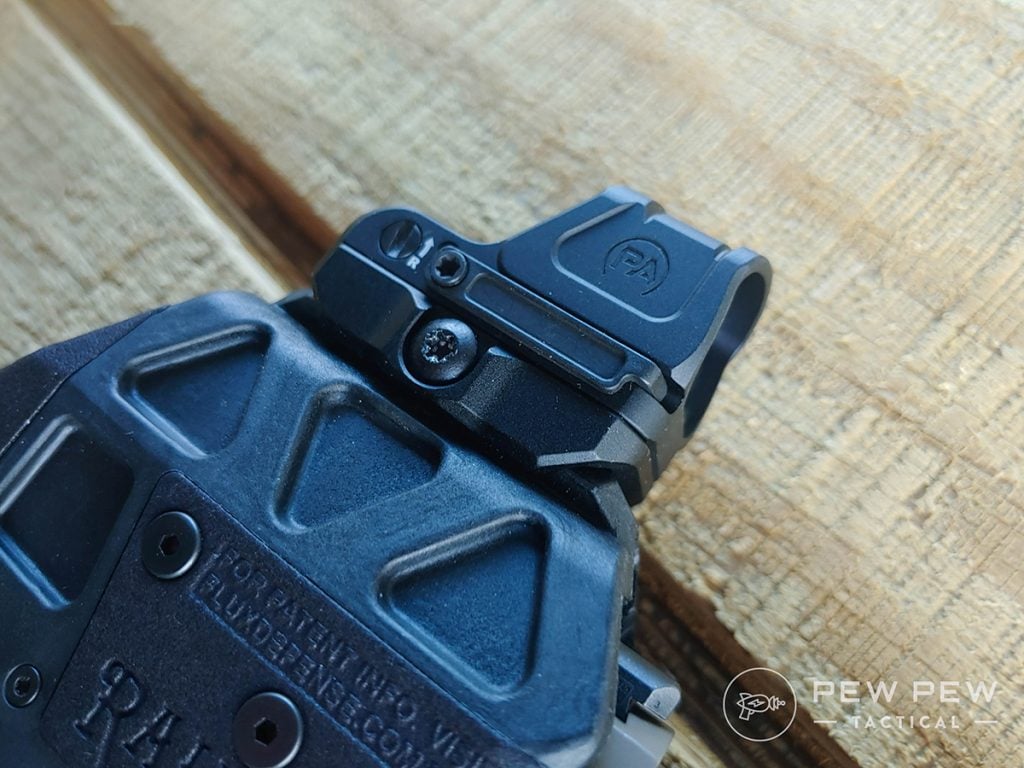
Mounting-wise, the RS-10 uses the Docter footprint and also comes with Glock MOS mounting plates. However, there have been some reports of fitment issues with Docter-cut PDP first-generation guns and PSA Daggers.
It also includes a Picatinny mount for use on larger pistols or even rifles.
Prices accurate at time of writing
Pros
Cons
Specs

Sometimes bigger is always better. Competition shooters who need to be able to have a wide field of view and ultra-fast target acquisition often seek pistol dots with the biggest windows they can find.
For the longest time, Trijicon’s SRO reigned supreme thanks to its generously sized glass, but Holosun has once again proven their willingness to challenge anyone and everyone with their newer 507Comp.
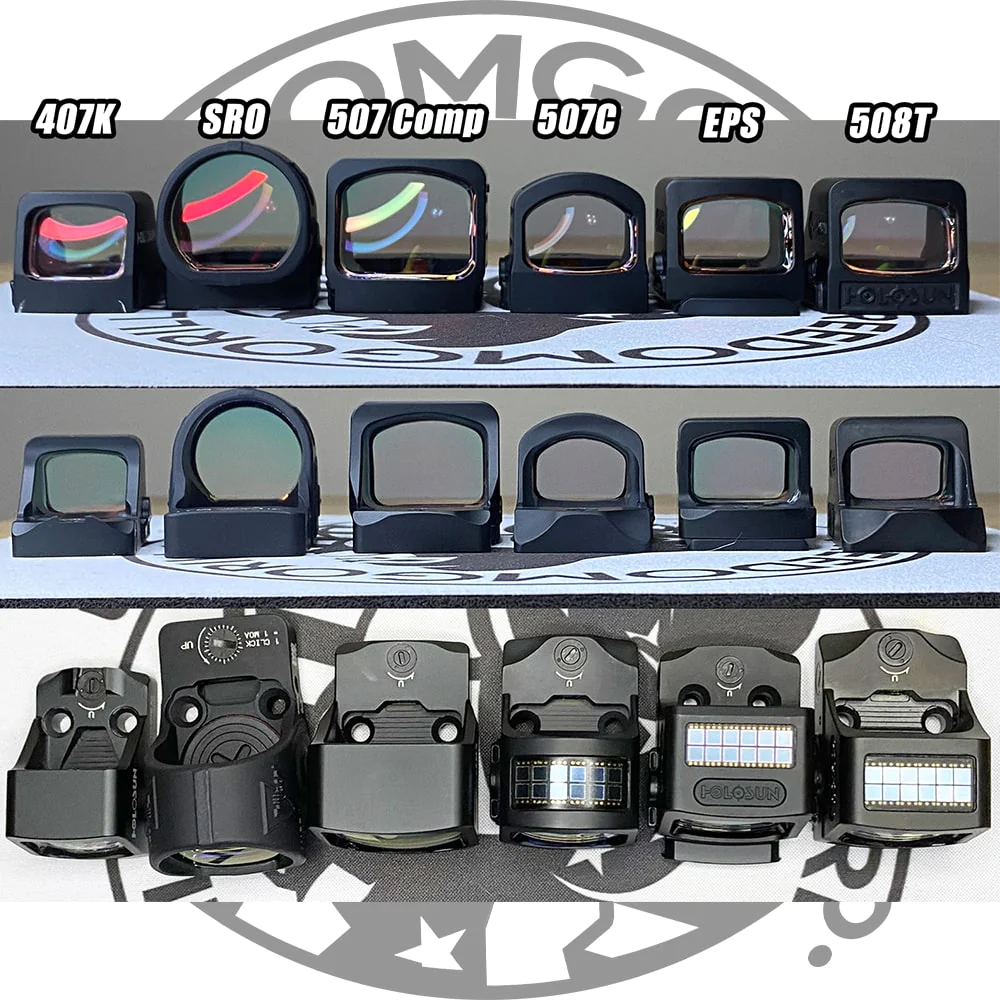
As the name implies, the 507Comp is meant for competition. A huge 1.1×0.87-inch window ensures that you will be able to see everything you need to.
Specific to this model is Holosun’s Competition Reticle System (CRS). It features a 2 MOA center dot, with three different-sized outer rings you can select: 8, 20, or 32 MOA.
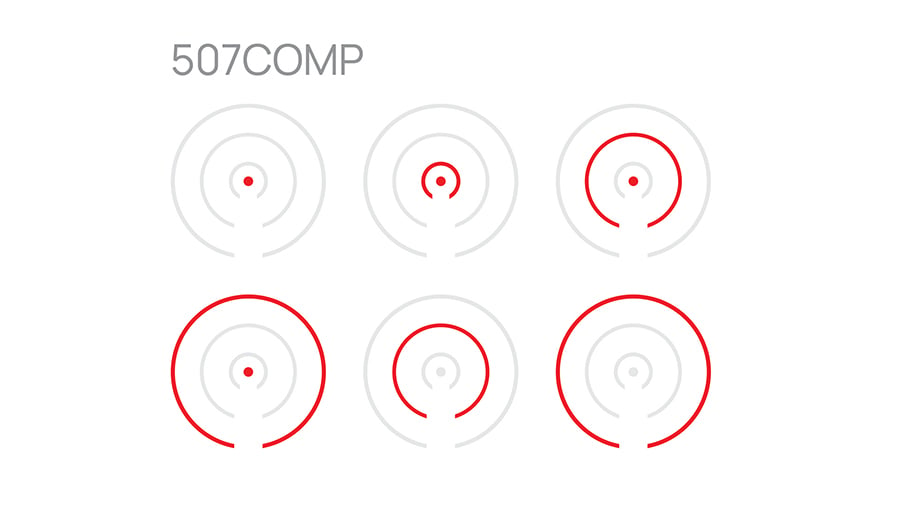
I sound like a broken record, but as per usual, you get the Holosun 50,000-hour battery life and shake-awake technology. However, this model does not feature a solar failsafe.
The 507Comp uses the same tactile button setup as their standard 507, but the buttons are slightly recessed to help prevent any accidental presses.
A side-loading tray makes battery changes easy, and the standard RMR footprint means mounting options are a-plenty.
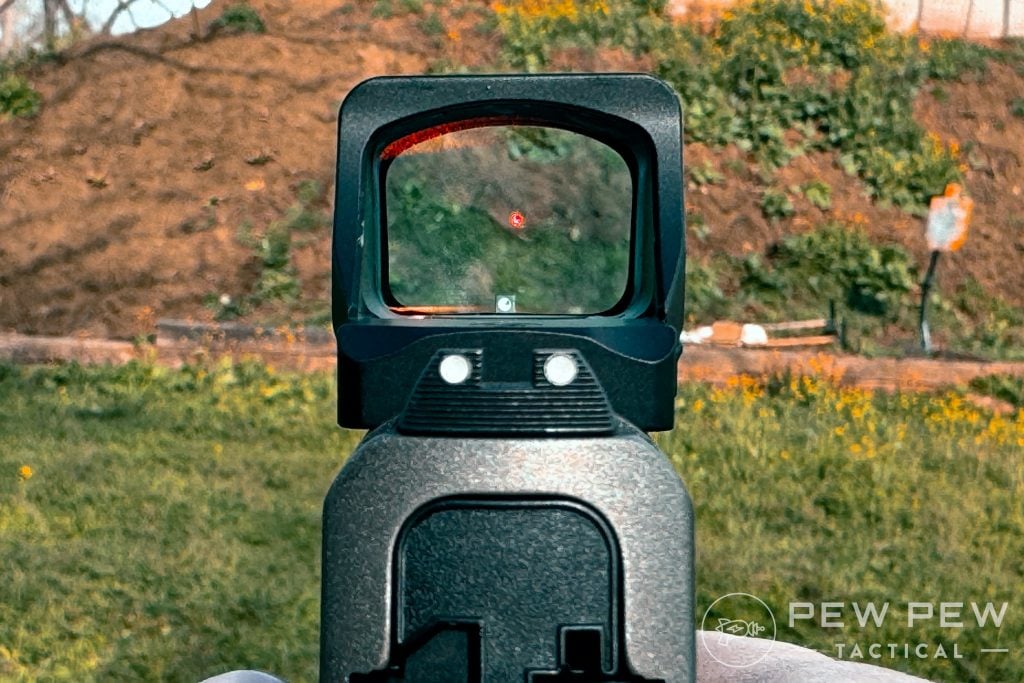
This is really one of the best optics on the market for competition shooting, especially given the price. My only complaint is that I wish it had an option for a 6 MOA center dot.
These are some of our favorite dots that use smaller footprints to fit on the ultra-popular micro compact genre of pistols.
Prices accurate at time of writing
Pros
Cons
Specs
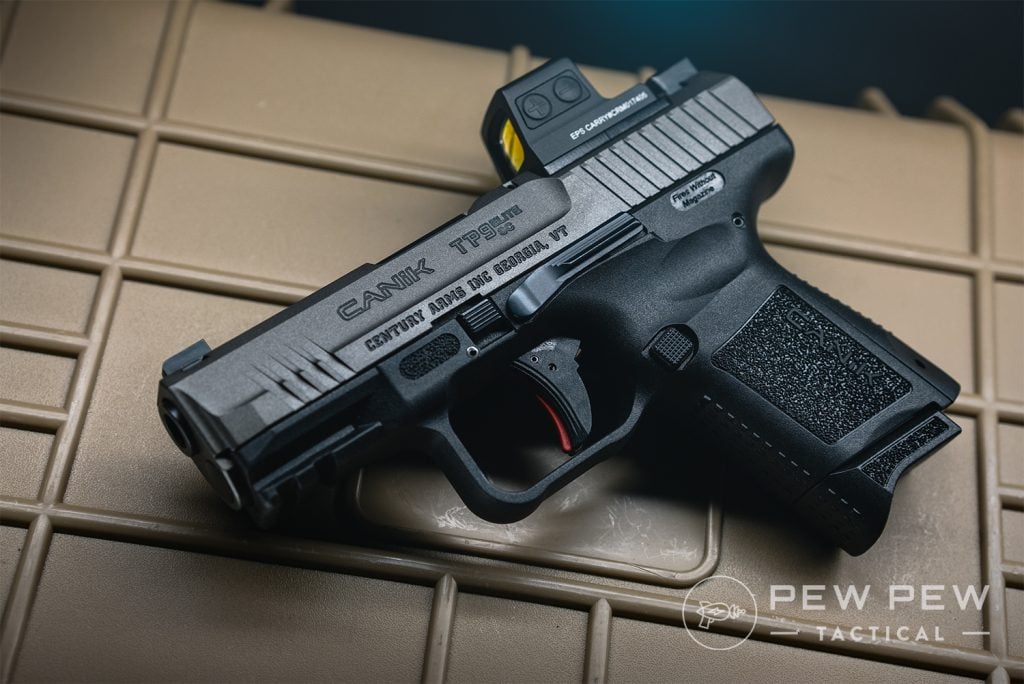
Holosun dipped their toes into the closed emitter red dot game with the introduction of their EPS and EPS Carry optics.
Enclosed emitter optics have the benefit of using two panes of glass to keep the dot emitter completely shielded from debris and the outside elements.
They have become a favorite among people who carry their weapons daily, carry in hostile conditions, or live in areas with less-than-ideal weather.
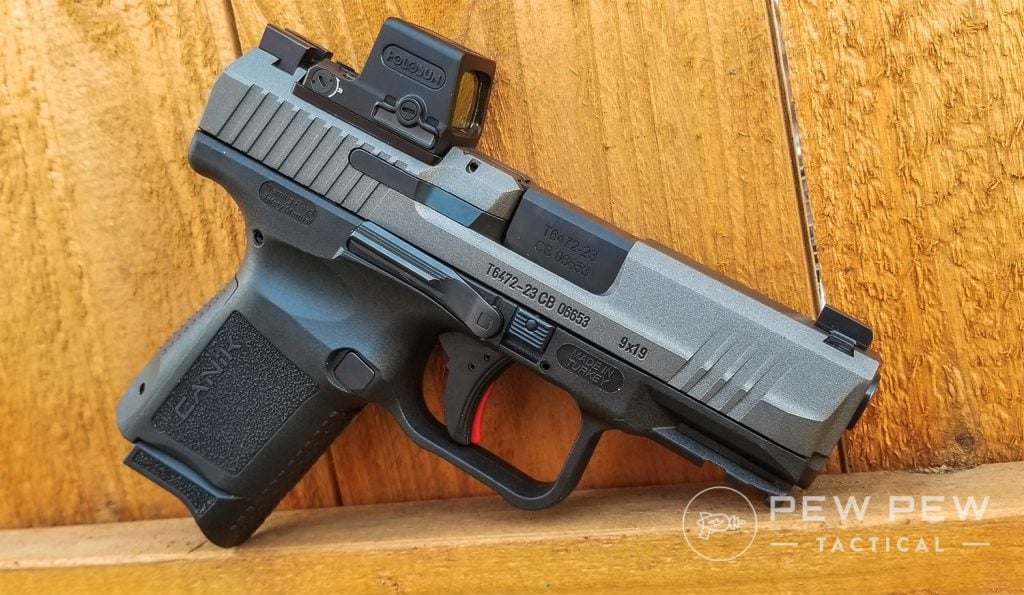
The EPS Carry MRS not only has a rugged enclosed housing but also has some other amazing features that are now synonymous with Holosun.
Shake-awake auto/off technology, a solar failsafe, a 50,000-hour battery life, a side-loading battery tray, and an IPX8 waterproof rating are all standard on the EPS Carry MRS.
The glass is pretty clear, with only a slight tint on both the MRS and the standard dot-only model, and the buttons are tactile and easy to use.
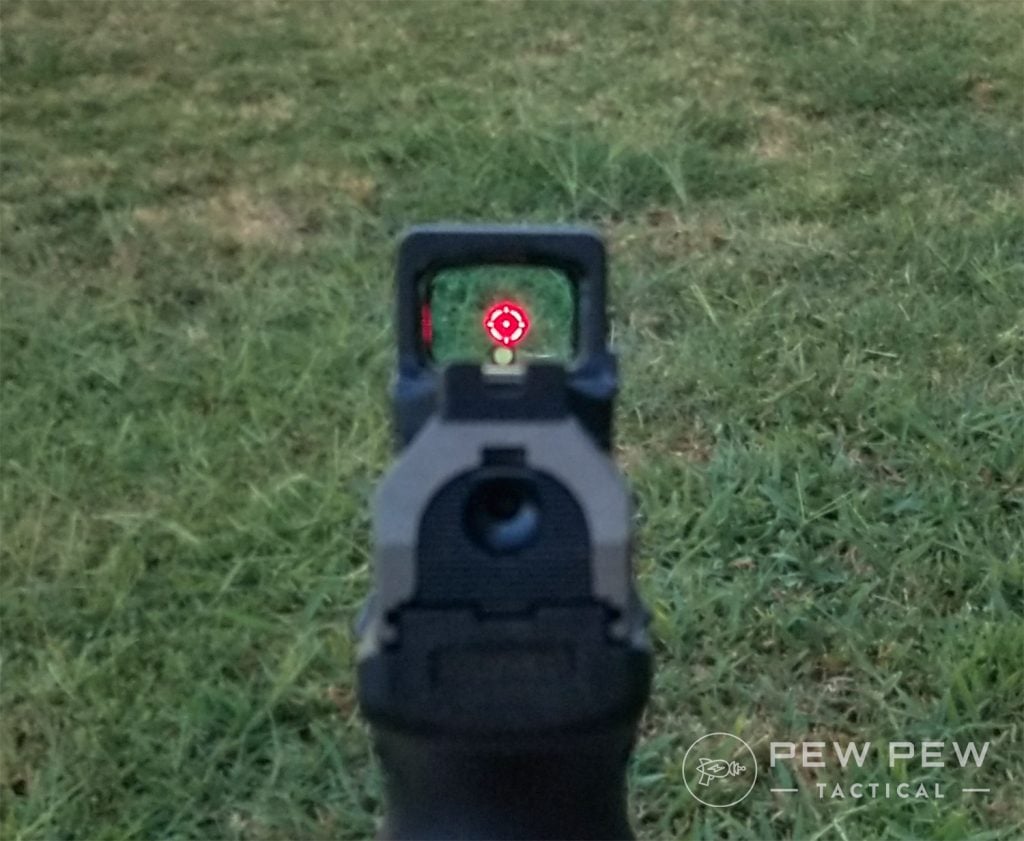
Users get a multi-reticle system that features a 2 MOA center dot with a 32 MOA outer reticle. This system allows users to swap between the dot-and-circle, dot-only, and circle-only (great for shotguns).
There are 10 daylight brightness settings, with 2 night vision settings for those so inclined.
Holosun wisely elected to use the Shield RMS/RMSc footprint, which has become the de facto standard footprint for all micro-red dots meant to go on smaller guns like the Sig P365 and similar.
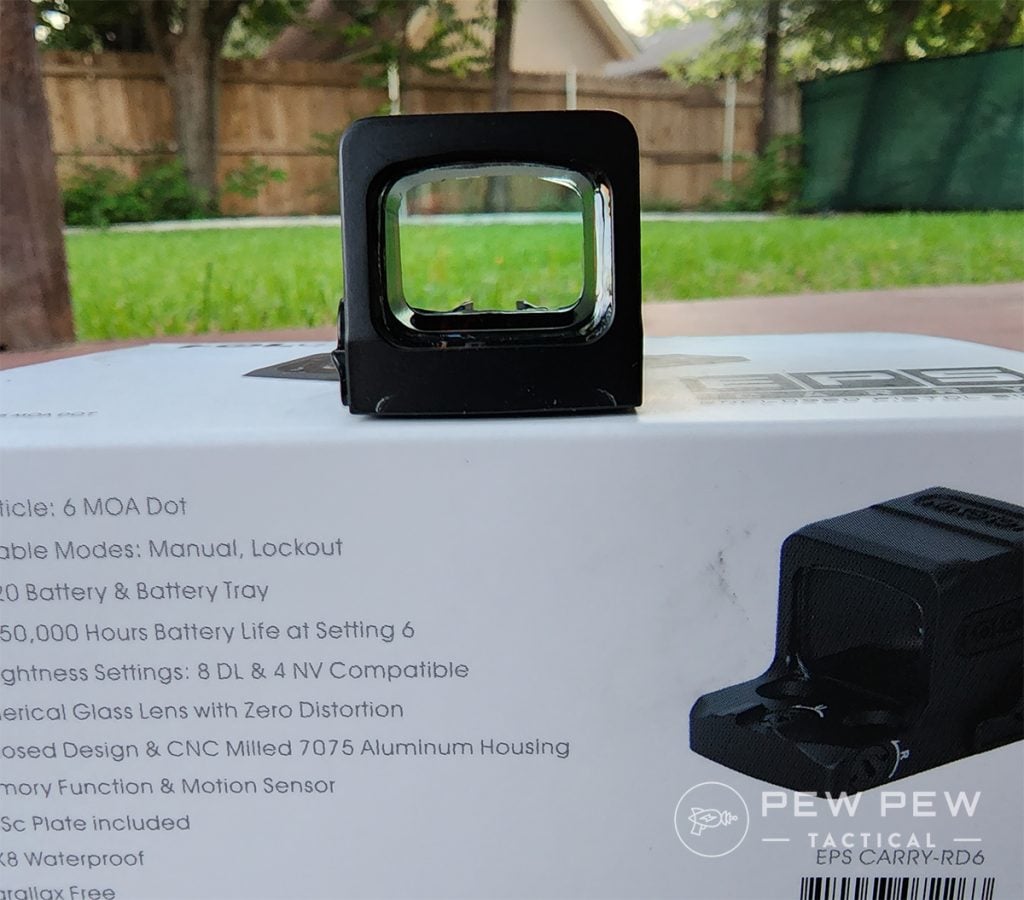
Overall, the EPS Carry MRS is packed full of features as expected from Holosun, with the added benefit of increased durability from the enclosed emitter design. This is one of the best optics on the market, hands down.
Prices accurate at time of writing
Pros
Cons
Specs
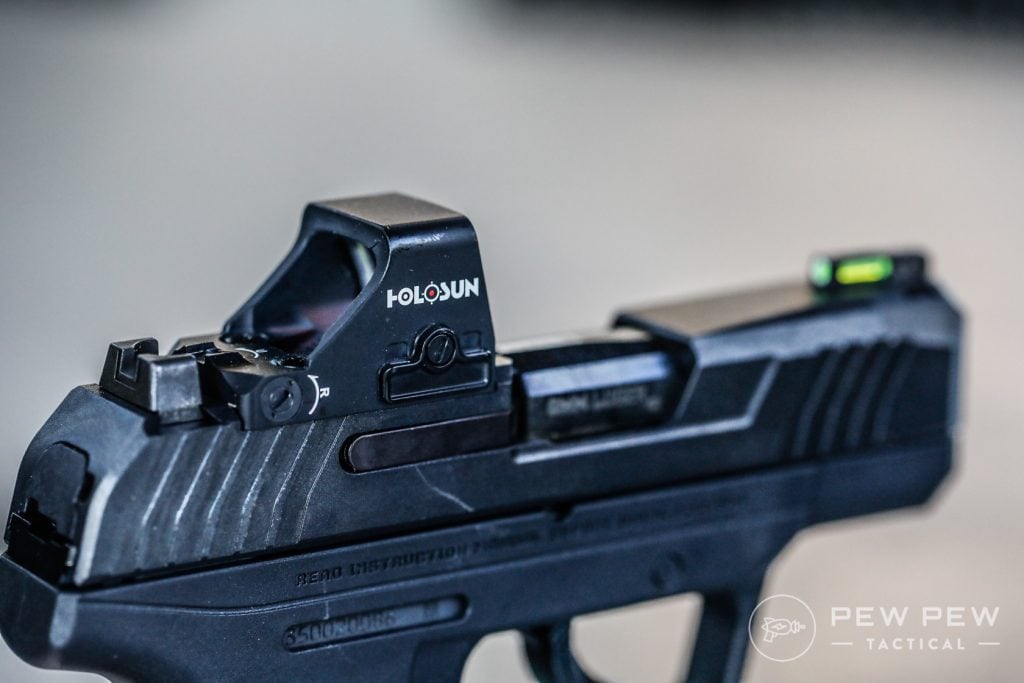
Let’s continue with Holosun’s micro red dot with its K model, the HS507K X2.
And just for comparison…let’s see the full-size C model vs. the K.
Like its bigger brother, the all-metal housing HS507K feels great in hand and has a nice chunky enclosure that’s sure to survive all but the worst abuse.
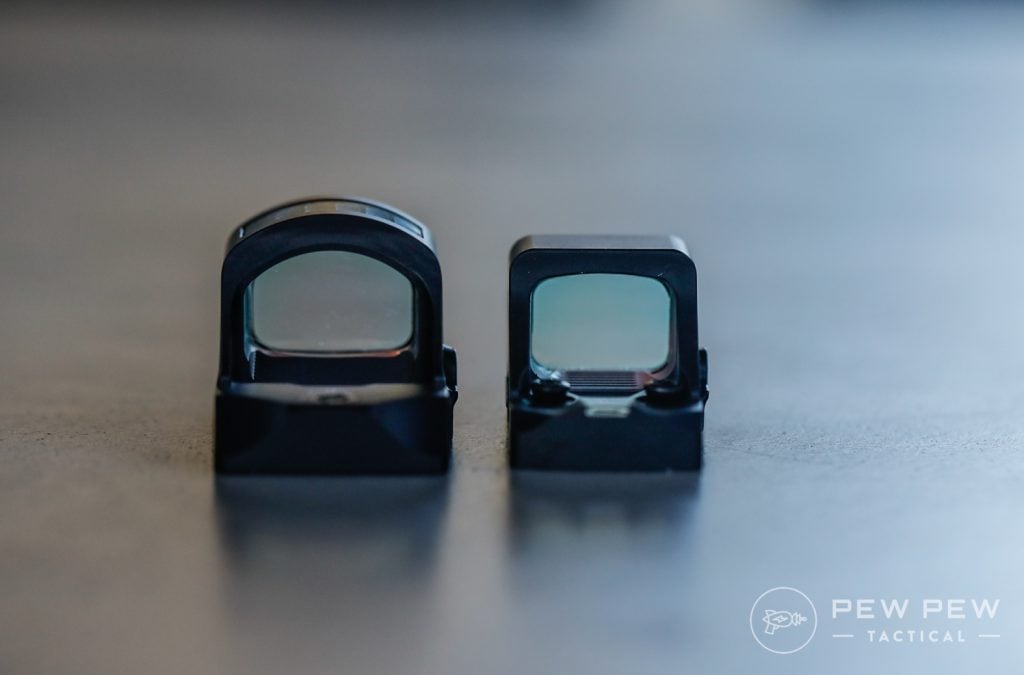
The +/- buttons are on the left side and easy to activate, and also turn the unit off by pressing both at once.
As per usual, Holosun delivers with a battery life of 50,000 hours (on medium settings). There’s also Lock Mode and Shake Awake tech to conserve even more battery life.
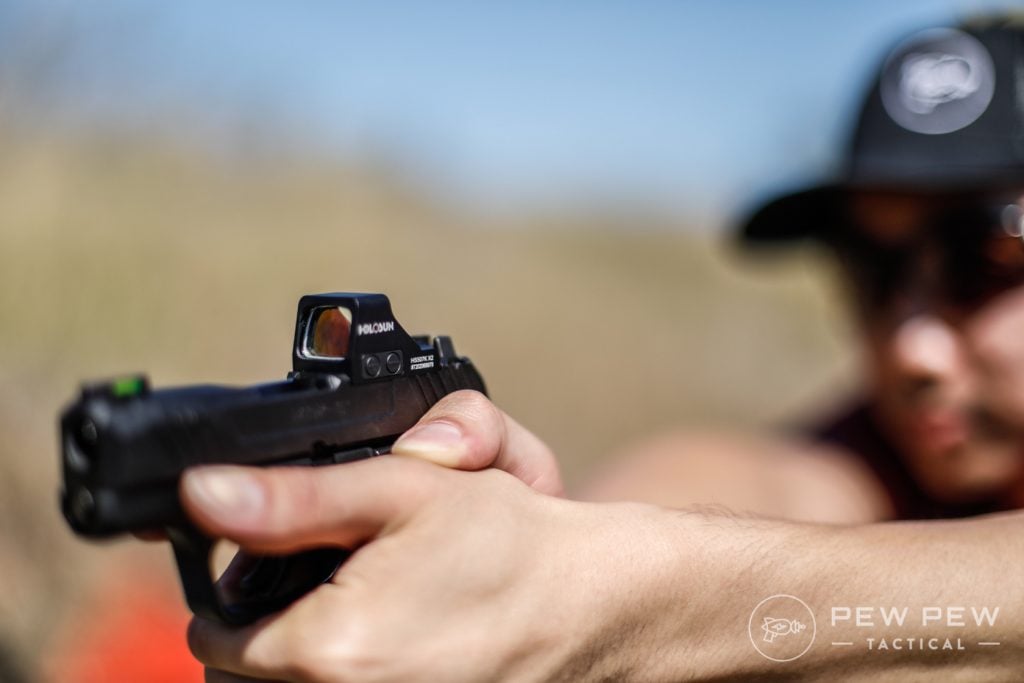
The big difference between the 407K and 507K is that the 507K has a multi-reticle system, meaning it has a 2 MOA center dot and a 32 MOA outer ring.
Pioneered by EOTech, the circle-and-dot combo is perfect for precise shots and also quick acquisition of minute-of-bad-guy shots.
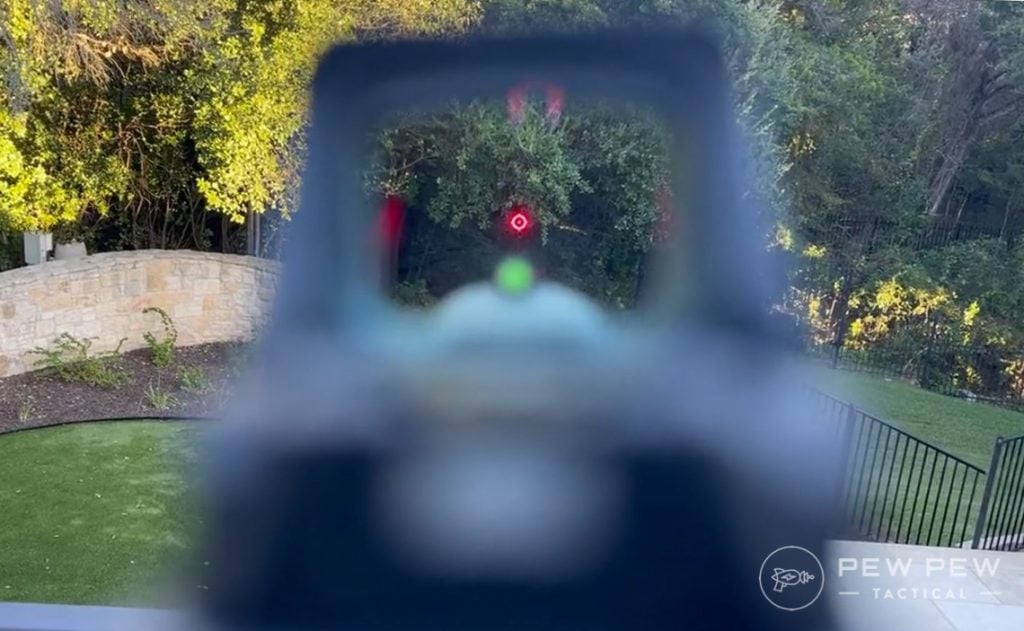
Everyone who shot the 507K thought it was cheating. If any part of the reticle was on target, it was a hit.
As with the EPS Carry, the 507K uses the industry standard Shield RMSc micro footprint that is found on most 9mm micro compacts.
Although it lacks the enclosed emitter and solar failsafe of the EPS Carry, the 507K still packs most of the same features while managing to come in $100 less, making it a great buy.
Prices accurate at time of writing
Pros
Cons
Specs
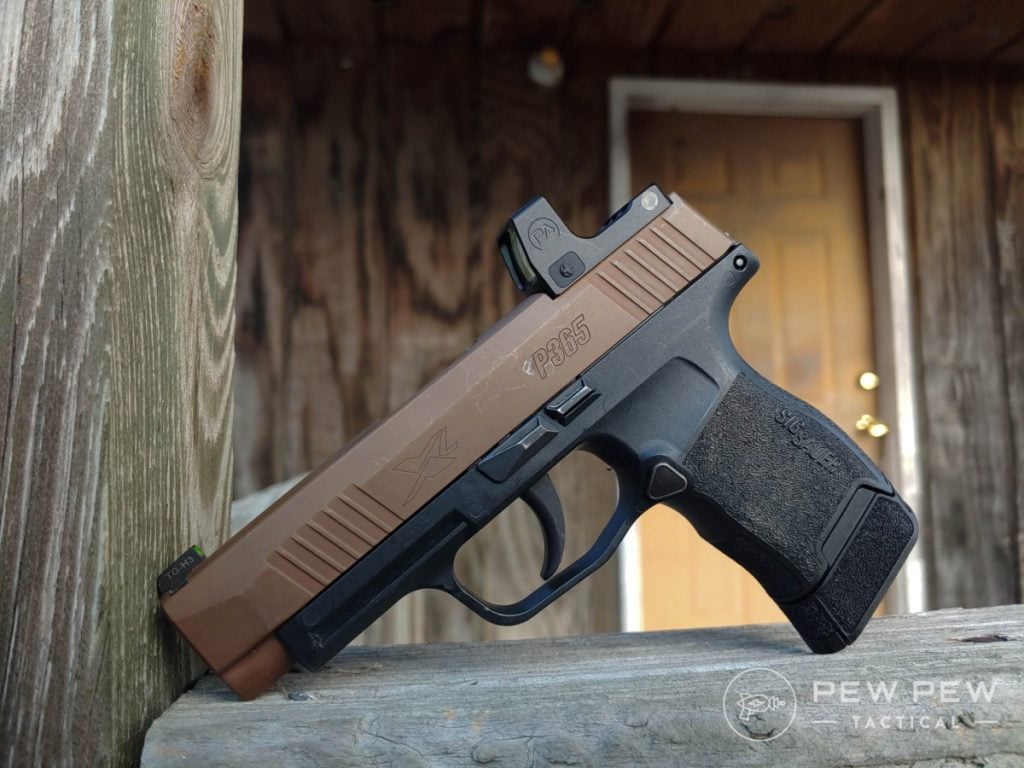
Another newer micro red dot from Primary Arms is their Classic Micro. This is a very affordable dot that still has great battery life.
The Classic Micro is very spartan in its looks, but the buttons on either side are useful and provide great feedback.
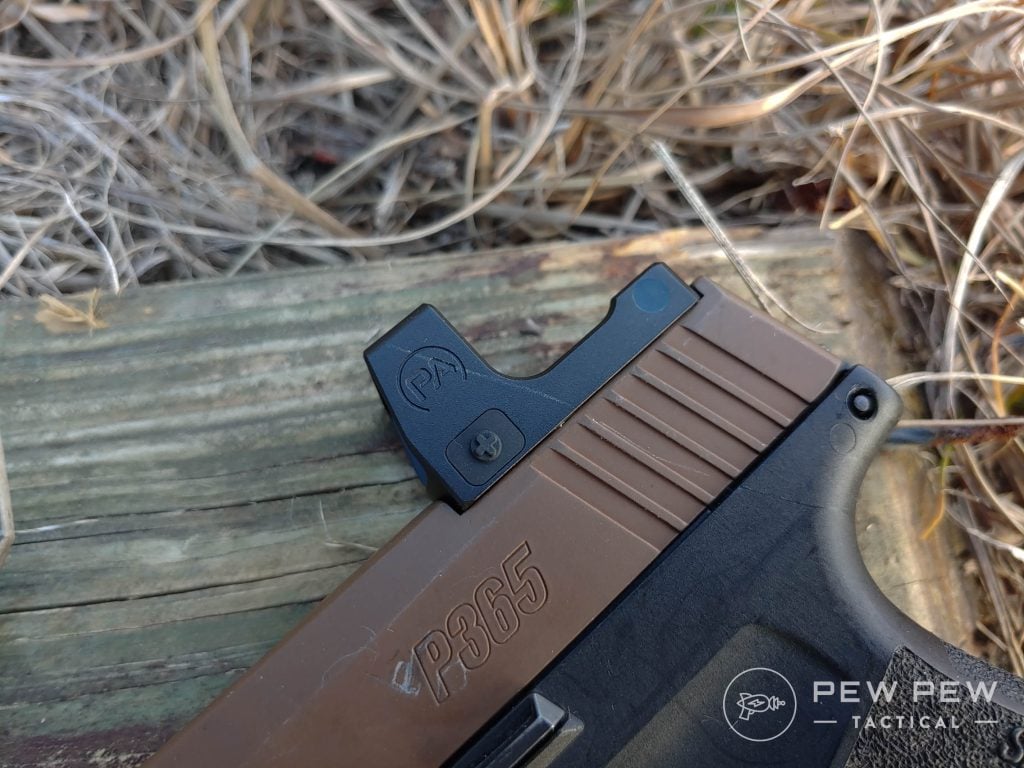
Unfortunately, the battery is located at the bottom, so you’ll need to take it off and re-zero each time you want to swap it.
Even with the annoyance of having to remove the sight and re-zero to change the battery, you only really have to do it once every few years thanks to its 25-50,000-hour battery life.
Being a budget-minded optic, you also don’t get shake-awake, so you’ll have to remember to turn it on/off for CCW purposes or just lean on the long battery life.
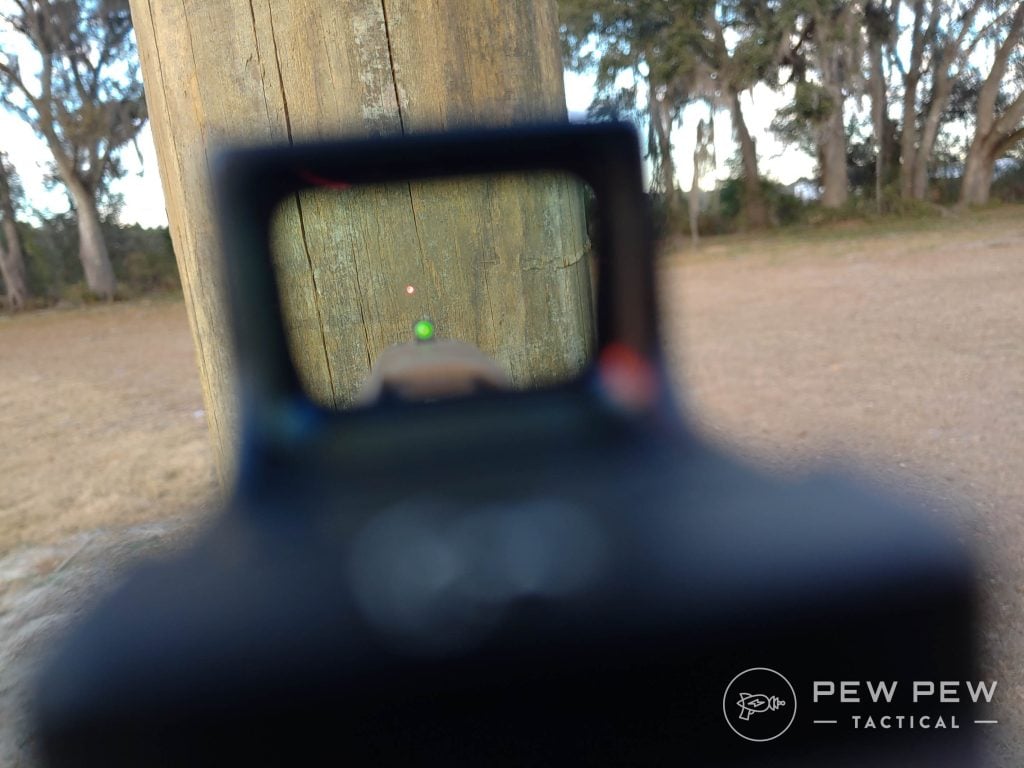
Zeroing takes an Allen key, which is not a deal breaker. However, there’s also no tactile click to let you know you actually adjusted something, so keep that in mind.
However, it’s held zero through everything we’ve thrown at it in the full review. The dot is easy to see and is bright enough even for the scorching sun.
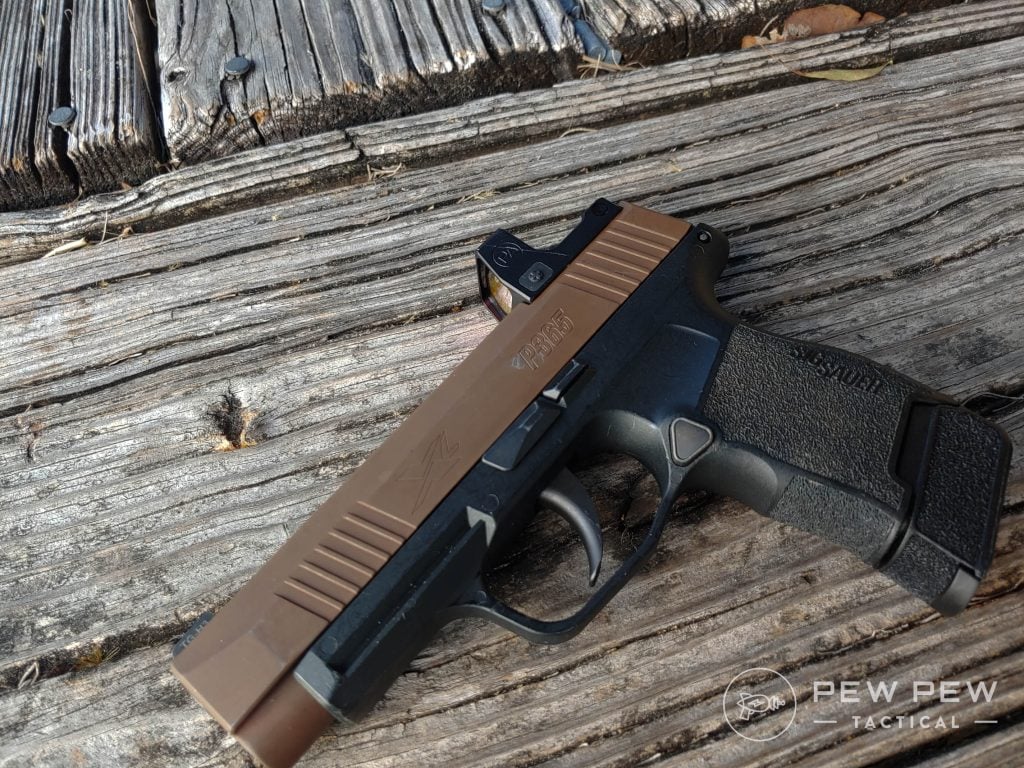
The Classic Micro uses the standardized RMSc footprint, so you should have no problem mounting it on almost any CCW gun.
This is one of the most affordable micro red dots currently on that market that is suitable for daily carry.
These are our top picks for those who want a fully enclosed emitter for increased durability on their non-micro compact handguns
Prices accurate at time of writing
Pros
Cons
Specs
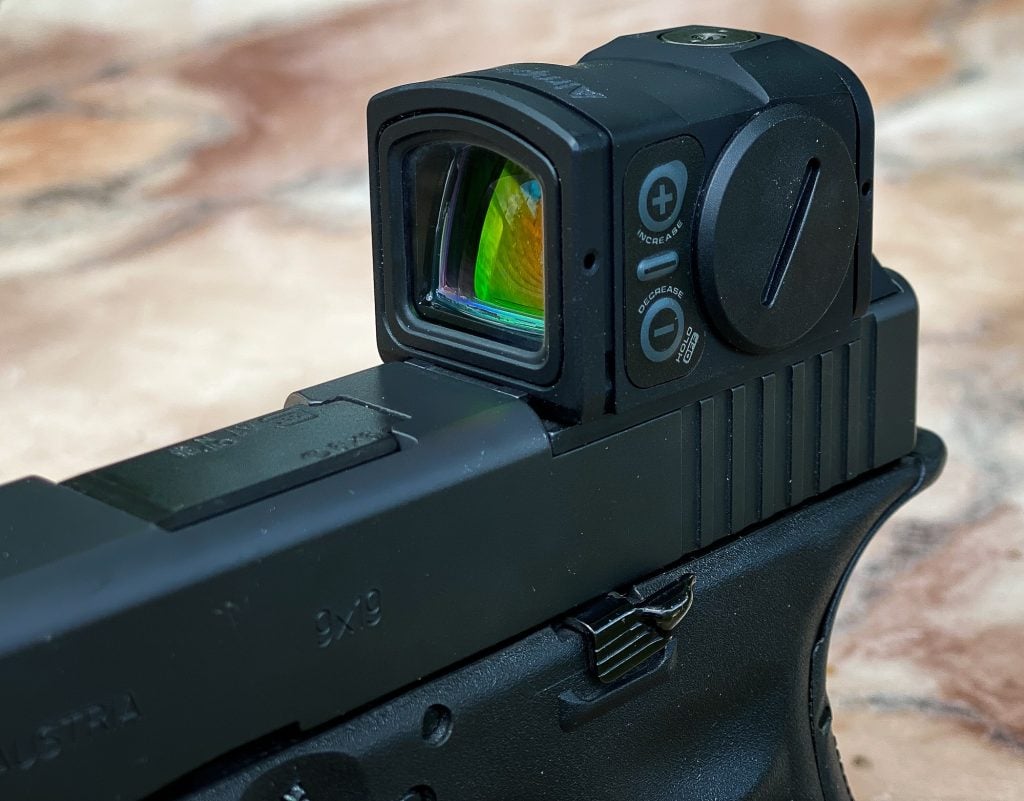
Aimpoint was the first to get into the enclosed emitter optics with their Advanced Combat Reflex Optic, or ACRO.
Their optic has since been upgraded to the ACRO P-2, which retains the qualities that made the original version groundbreaking while adding improved features.
To put it plainly, this is one of the toughest optics on the market. It is ridiculously overbuilt, is submersible up to 115 feet, and is extremely shock-proof.
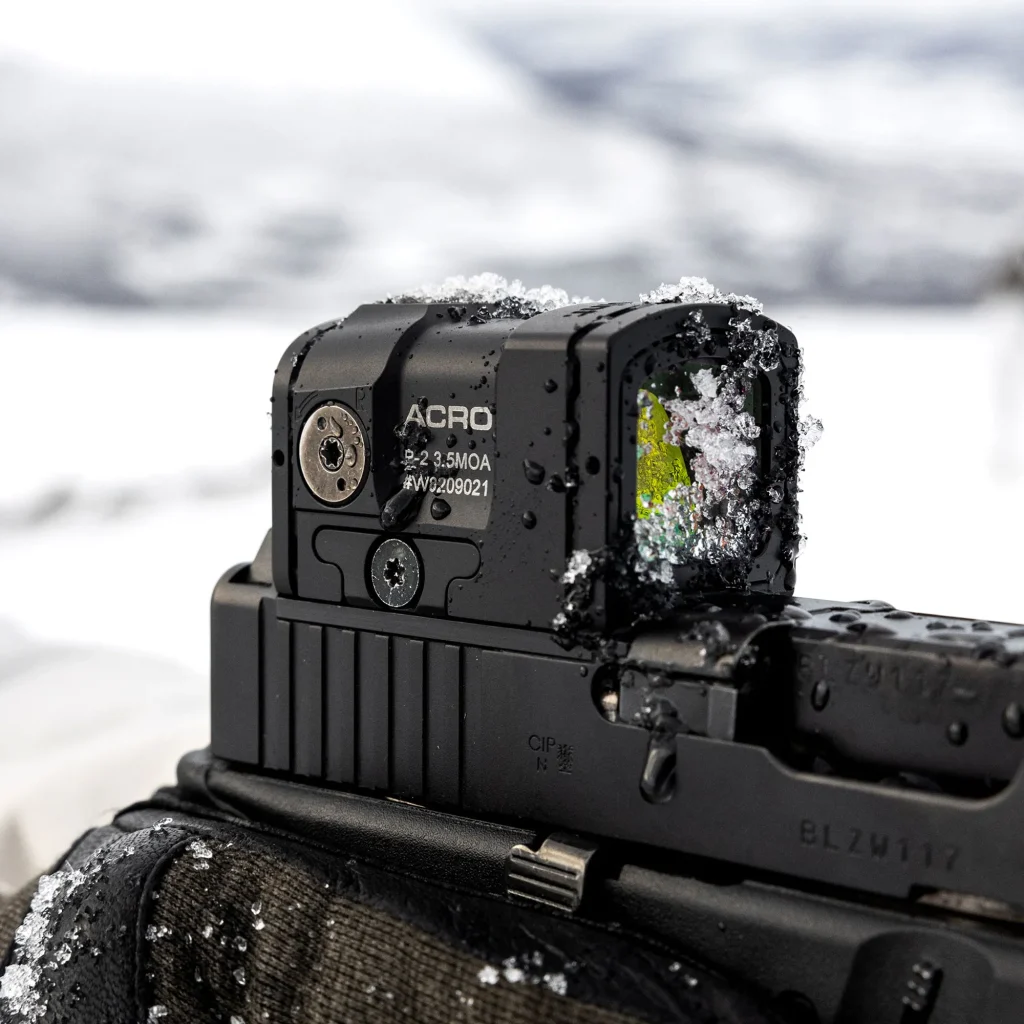
A crisp 3.5 MOA dot is paired with glass that is only slightly tinted.
The buttons are easy to use and tactile, and the side-loading battery ensures that you never have to remove your optic or re-zero when swapping it out.
Not that you will need to swap it often, as the ACRO P-2 boasts an impressive 50,000-hour battery life.
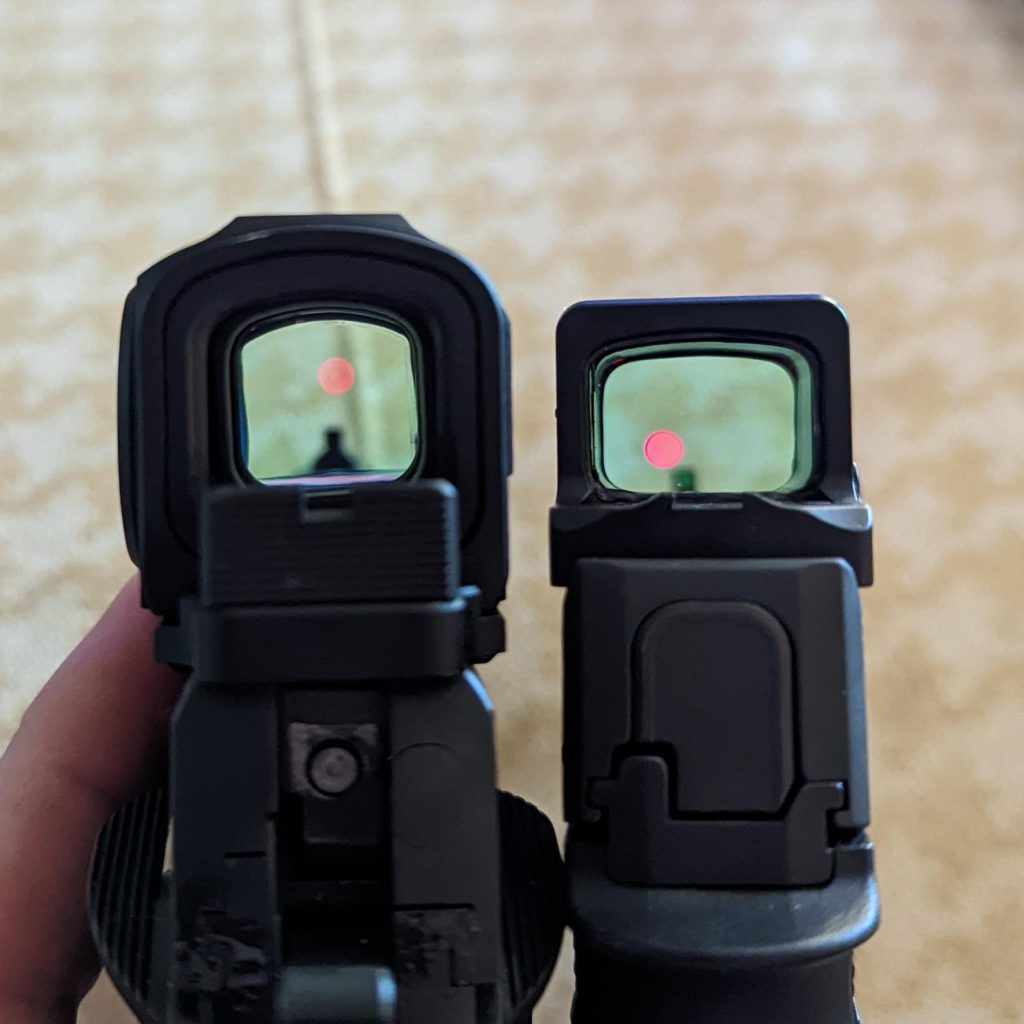
You get 10 brightness settings, which include 6 dedicated daytime settings and 4 night vision compatible settings. This optic performs extremely well under night vision, as most Aimpoint optics do.
The biggest downside, apart from the size of the viewing window, is the proprietary ACRO footprint. Adapter plates are readily available, but increase the cost as well as make the already-tall optic sit even higher.
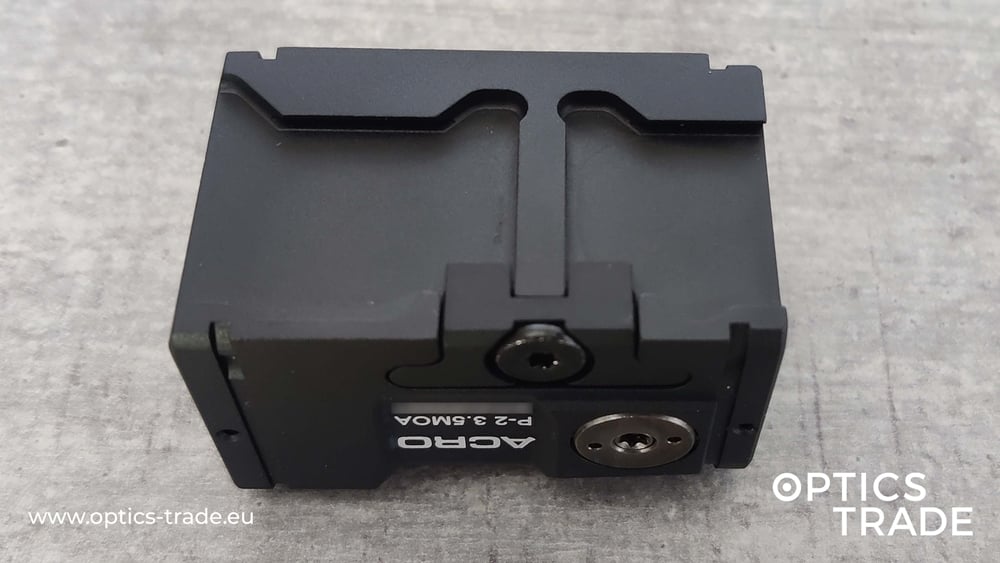
But if you are looking for a proven optic that has been around, improved, and is bomb-proof in any and all conditions, the ACRO P-2 has the pedigree to back it up.
Prices accurate at time of writing
Pros
Cons
Specs
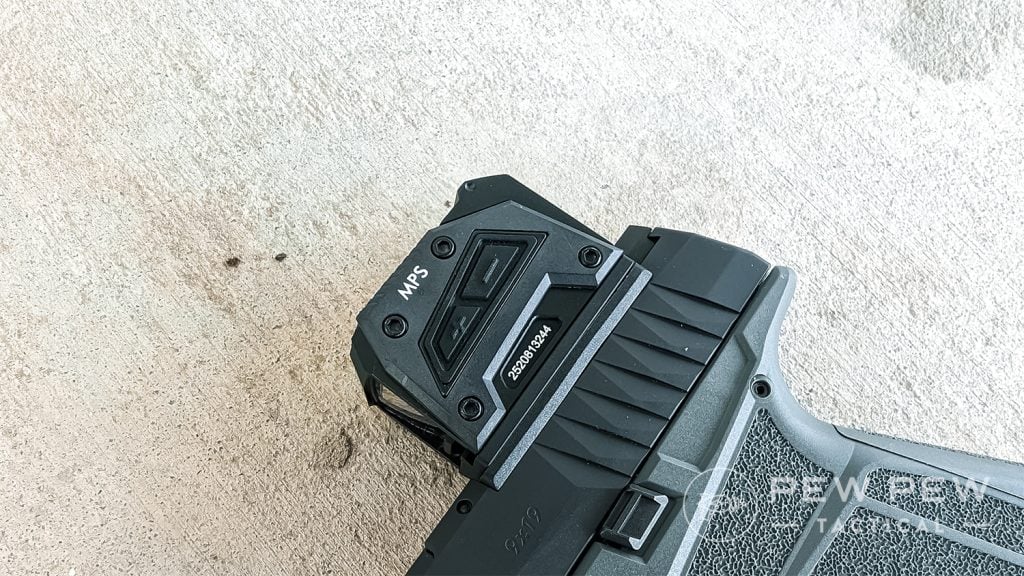
While Steiner can be known for lagging behind in terms of innovation or following the flow of the market, that isn’t the case with their Micro Pistol Sight (MPS).
Not only is this an excellent duty-grade enclosed emitter optic — it has an attractive price.
Looking through the MPS will reveal crystal clear glass, a crisp 3.3 MOA dot, and a generous 21x16mm window.
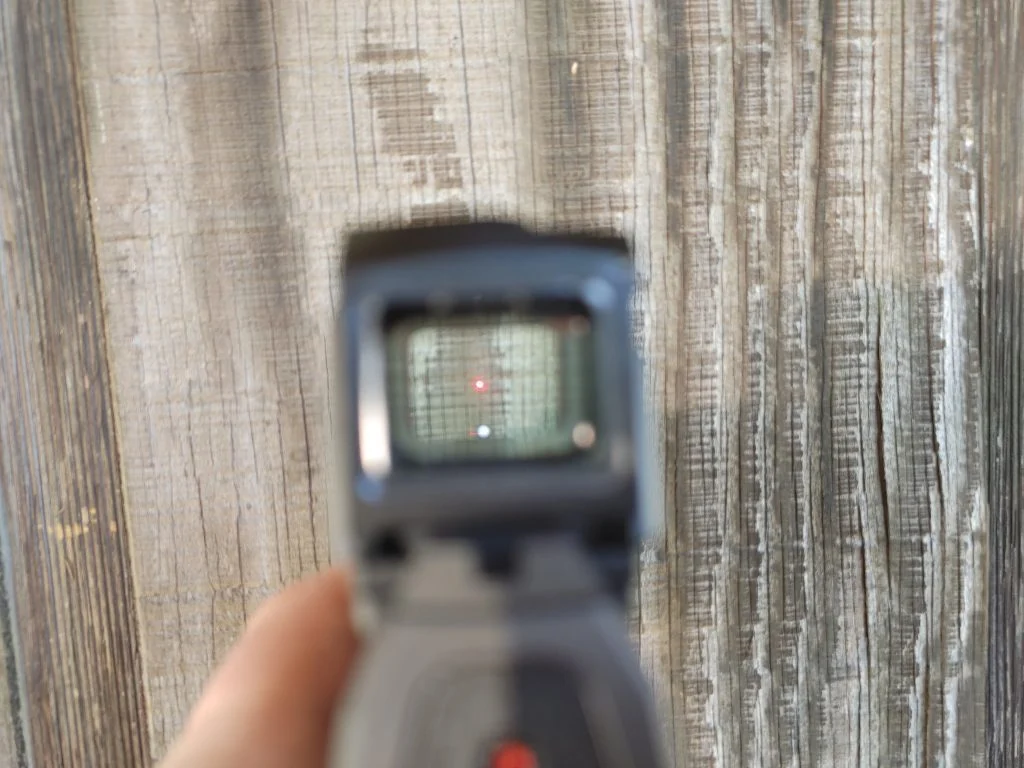
The controls are tactile but also recessed to prevent unwanted inputs. An aggressive front hood also protects the extensively recessed front lens to provide maximum protection of the glass.
A unique feature of the MPS is that the emitter sits at the top of the optic. This reduces the room needed at the bottom and allows it to sit lower than the competition.
The MPS does not have a shake-awake or auto-on function, but it does have an auto shut-off after 13 hours (strange choice).
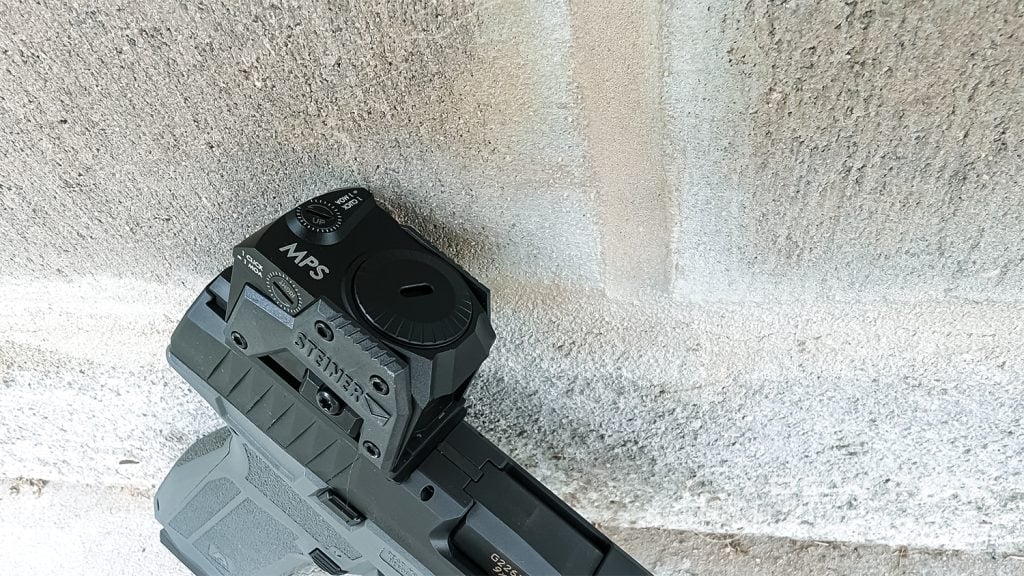
Battery life is quite lower than many of its competitors, at 13,000 hours, but a top-mounted battery makes changes easy and pain-free. You get 8 brightness settings in total, with 6 for daytime, and 2 for night vision.
Steiner elected to use the ACRO footprint, meaning any ACRO adapter plates or ACRO-ready firearm will also be able to accept the MPS.
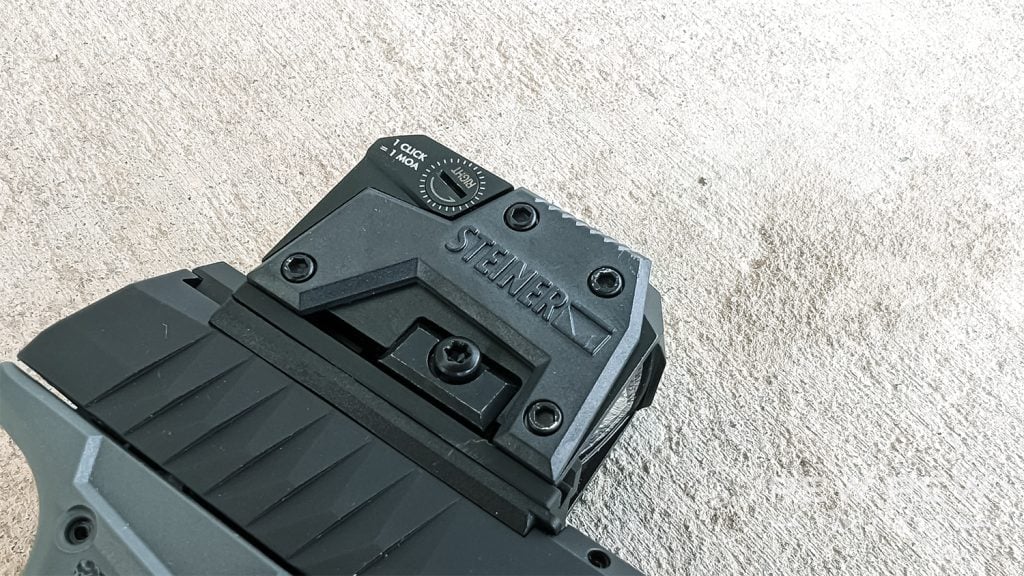
If you are looking for a rugged enclosed emitter optic without the price that comes with the ACRO P-2, the MPS is a great alternative.
Prices accurate at time of writing
Pros
Cons
Specs
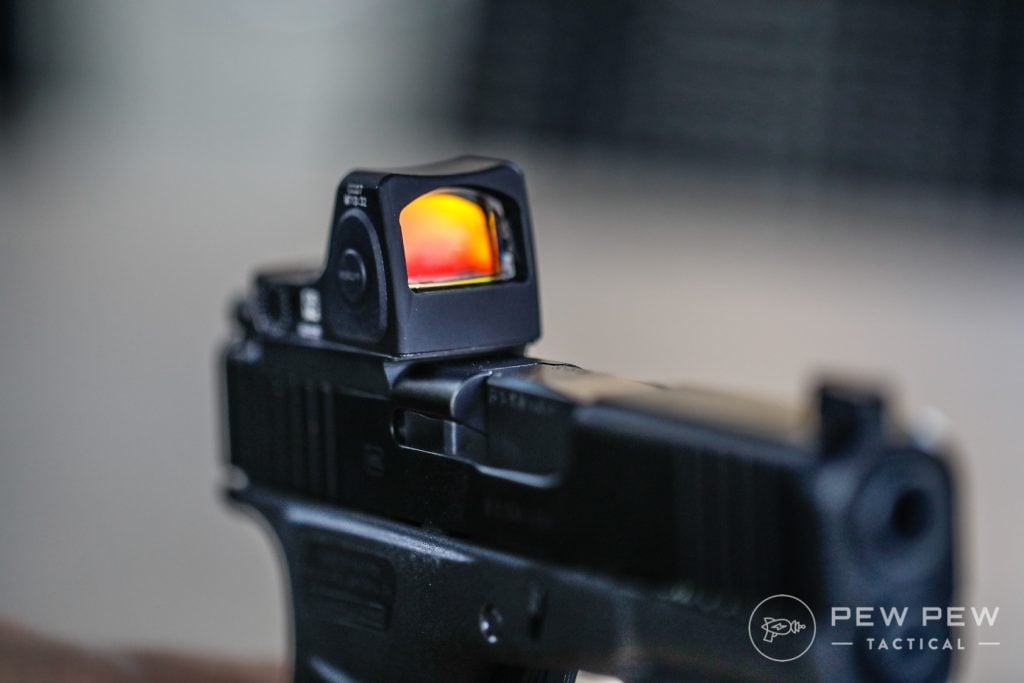
Does Trijicon still reign supreme even in the world of micro red dots with its RMRcc?
It looks great and is essentially a smaller RMR. So it’s built like a tank and will survive almost anything you can throw at it.
You get nice tactile buttons on each side and essentially tool-less adjustment for windage/elevation.
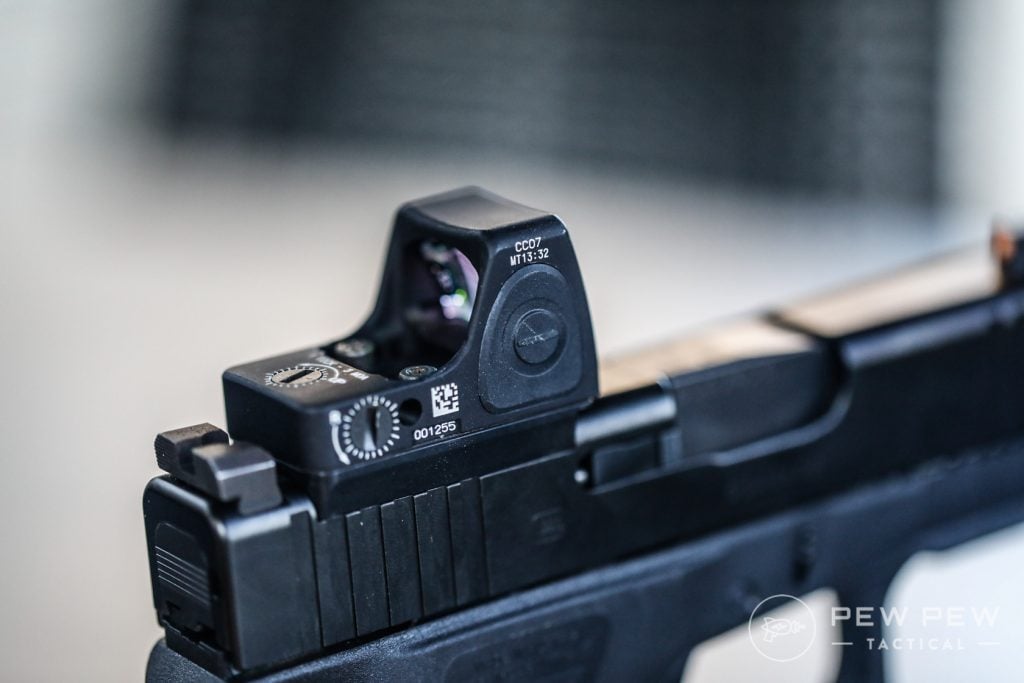
Battery life is a claimed 4 years, which puts it at the higher end of the spectrum. Plus, it also has the ability to either secure auto-brightness for carry or a user-chosen brightness.
Reticle-wise you get a choice between 3.25 or 6 MOA reticles, both excellent options.
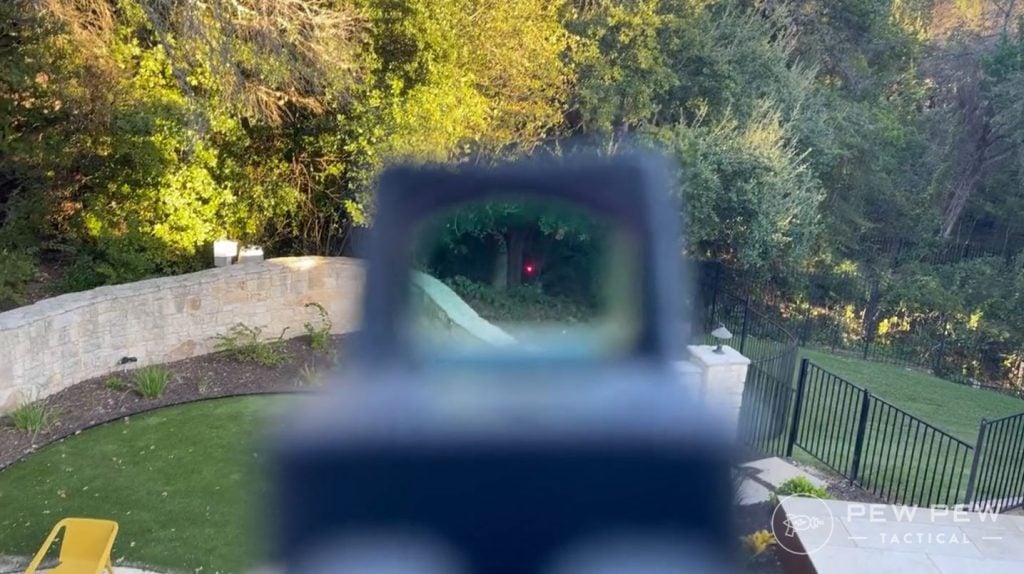
The dot is crisp and bright, but the window tint is slightly blue/green.
Here is where the RMRcc strays; it went with its own footprint instead of the RMSc standard for micro compacts. Therefore, you’ll need adapter plates, which will raise the overall height.
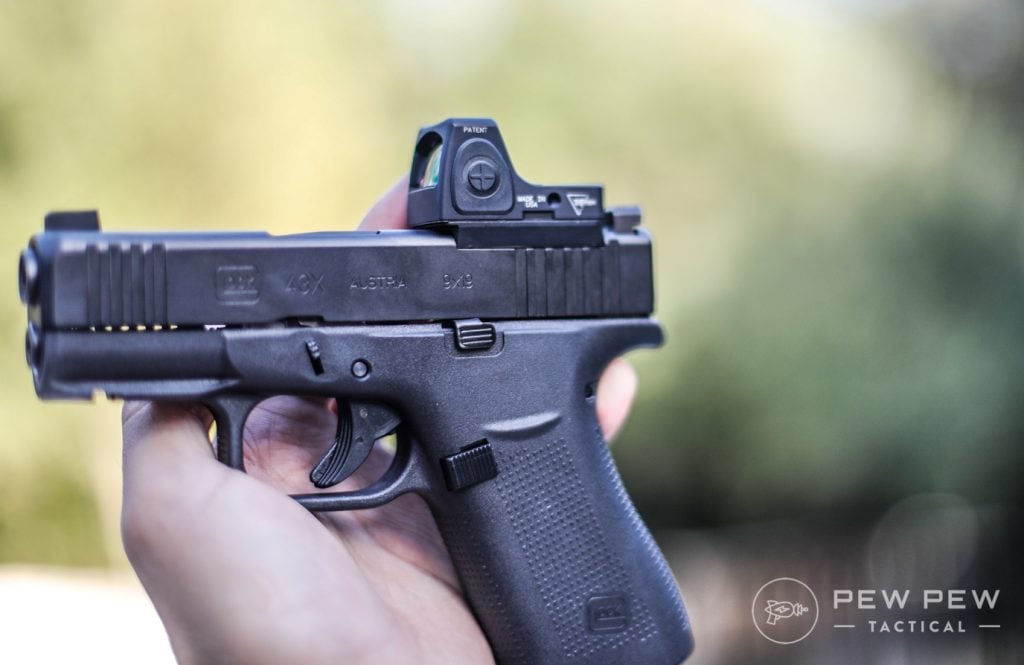
It’s a tank just like its bigger brother, and if it weren’t for the proprietary footprint and taller mounting with adapter plates, the RMRcc would be my choice to mount on a serious carry gun.
Prices accurate at time of writing
Pros
Cons
Specs
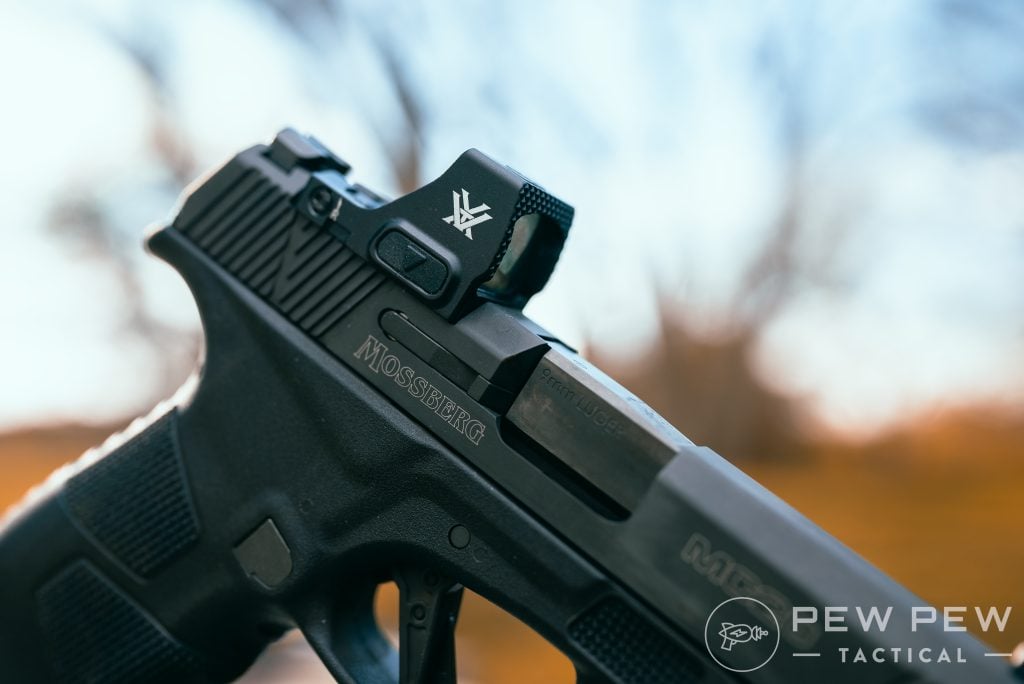
In 2023 Vortex set out to shake up the red dot world with their new Defender CCW. This compact, yet ruggedized optic was a culmination of everything the American company had learned to date.
Vortex first focused on making the Defender tough, with a 7075 aluminum body and aspherical, coated lens. There’s even a polymer bumper on the top for shock and a textured face for racking the slide off the optic.
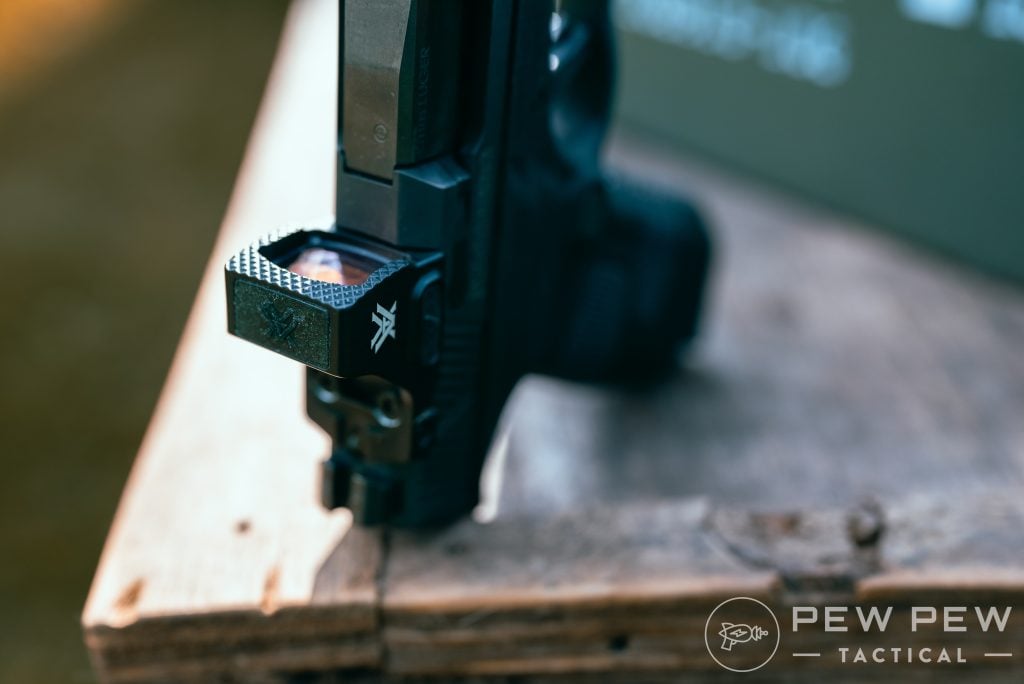
The Defender CCW uses a top-load battery, so you don’t have to remove it and re-zero for replacement. It also comes equipped with o-ring seals, keeping it dust and waterproof.
Vortex indicates the Defender CCW runs on an included CR1632 battery for approximately 9,500 hours.
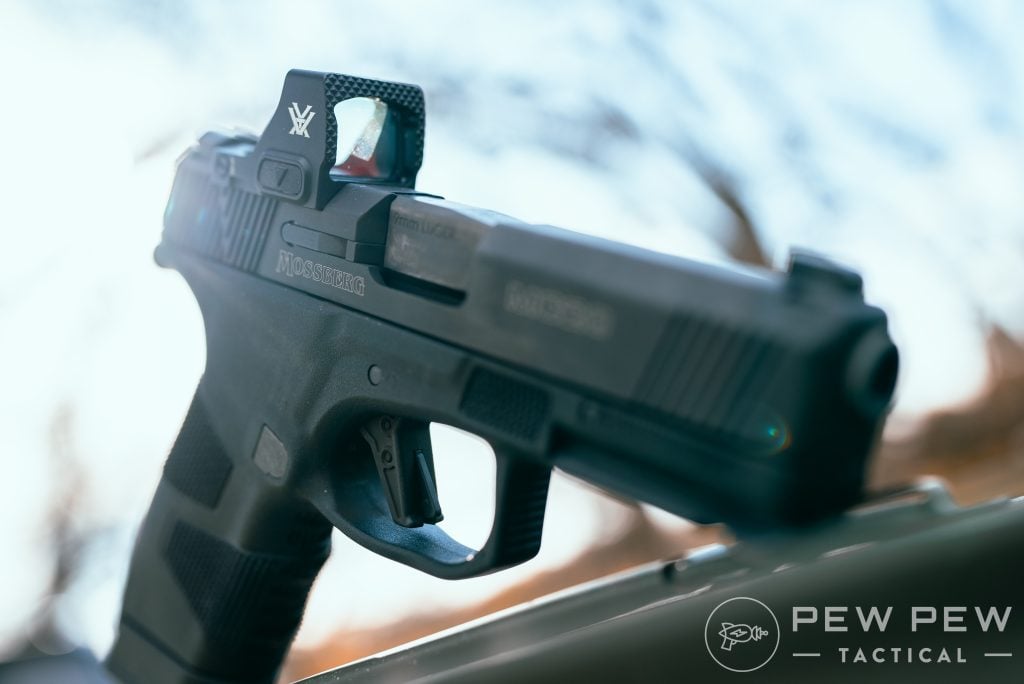
Inside, the electronics boast a suite of important features like motion activation, as well as a 10-minute auto-shutoff. Available with 3 or 6 MOA dots, the Defender has ten brightness settings, with the two lowest being night vision compatible.
As for the durability, we’ve tested it ourselves during a 1,000-round burndown we conducted on the Mossberg MC2C. The Defender CCW (and Mossberg) held up great despite running through a case of ammo in short order.
The Defender CCW utilizes the Shield RMS/RMSc footprint, but also comes with a Picatinny mount.
Prices accurate at time of writing
Pros
Cons
Specs
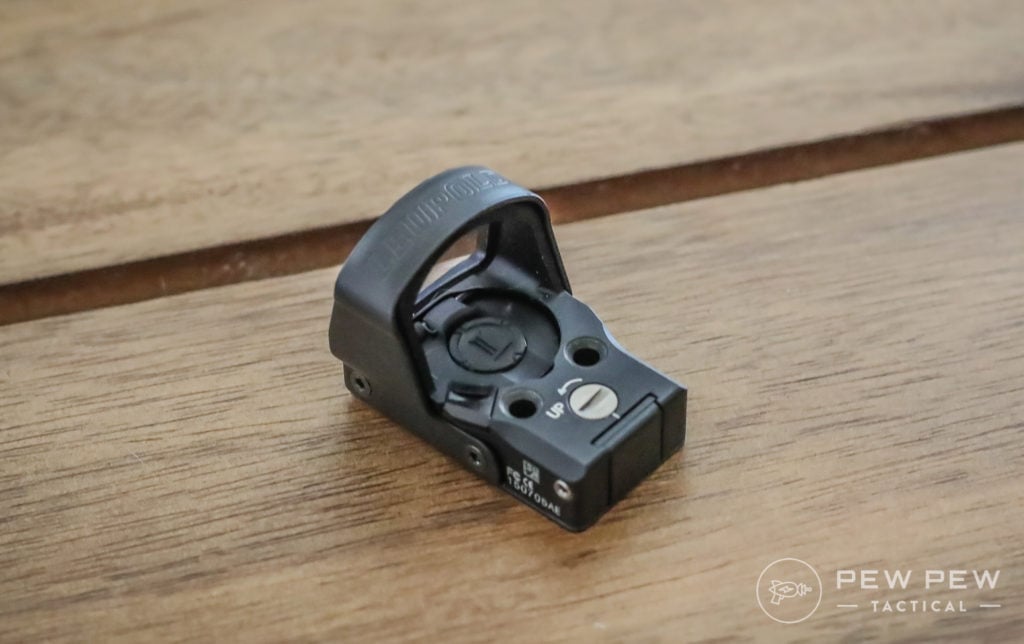
Another great option is the Leupold DeltaPoint Pro (DPP).
While slightly bigger than the RMR, it has been a favorite of mine for competition shooting due to the extremely clear glass and large viewing window.
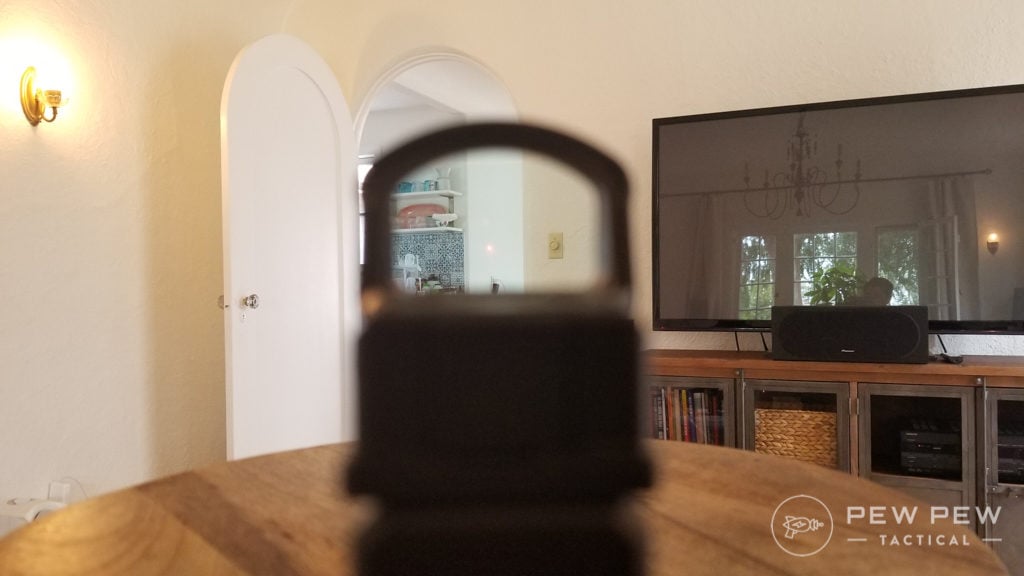
The 2.5 MOA is reasonable for close-up work and really beneficial for longer-range shots.
Although plenty rugged with its double hood…I’d still give the overall win to the RMR in that department.
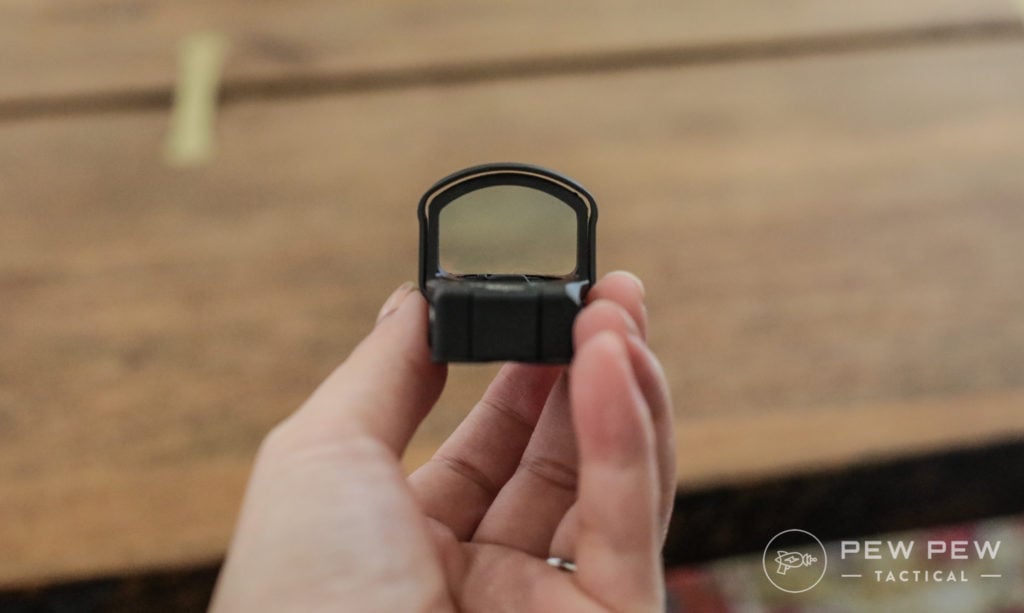
Leupold doesn’t list exact stats for battery life, and reports seem to vary from 2-8 months of battery life depending on the usage. This is definitely one of the weak points of this optic.
However, the battery is top-loading, so you don’t need to remove your sight and re-zero when you swap it out.
Another great thing is that it has a motion-sensing auto-on function. It’s plenty fast, and when I used it…it was always on before I could finish my draw.
Control-wise, you get one big spongy button in the middle that you have to keep pressing to go up and down in brightness, with a hold to turn it off/on if you’re not using the auto-on feature. This setup is less than stellar

Not a lot of custom slides are milled for the DeltaPoint Pro, but adapters for many common handguns are readily available. Picatinny adapters are also fairly easy to find.
The Outer Impact dovetail mount shown below also has worked well with the DeltaPoint Pro.
